Lecture 4 Marketing in China Part 1


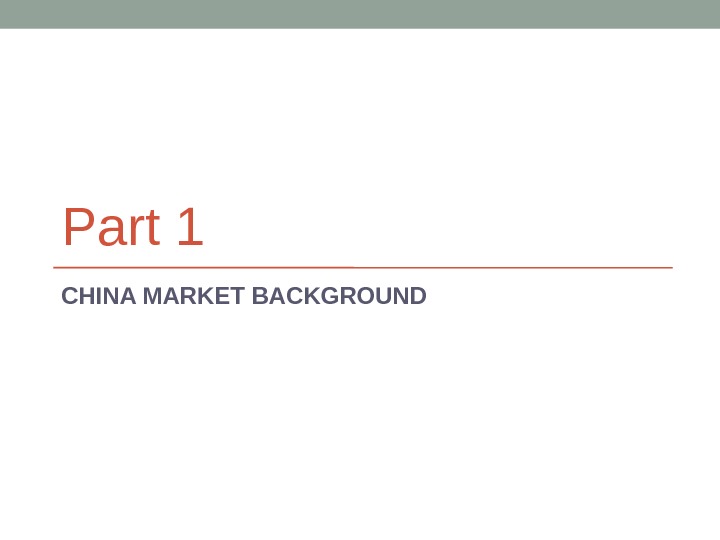




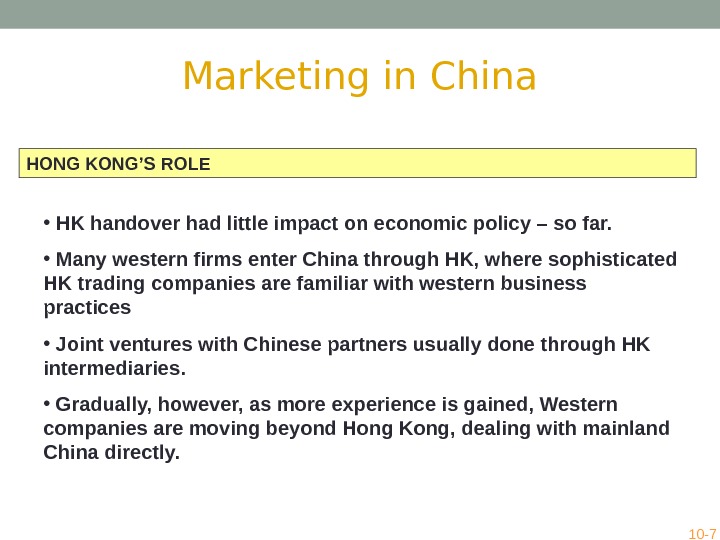

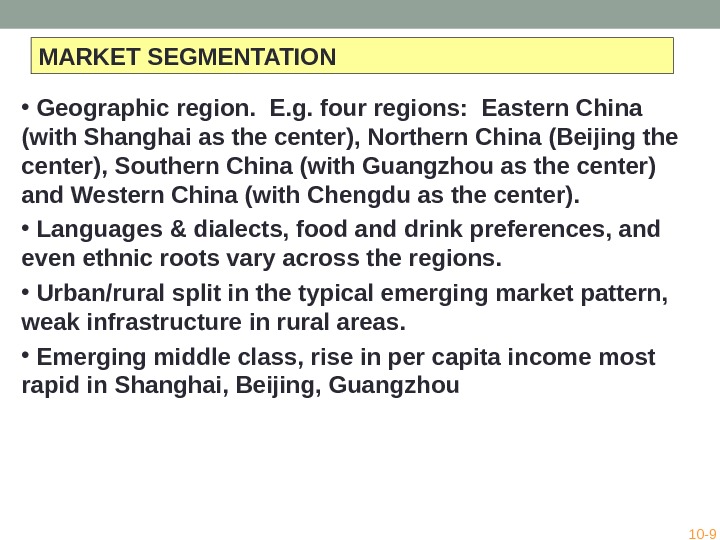







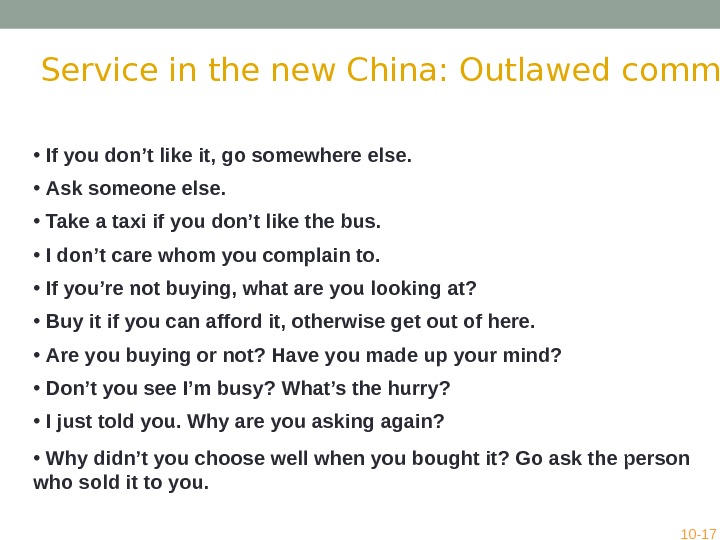



























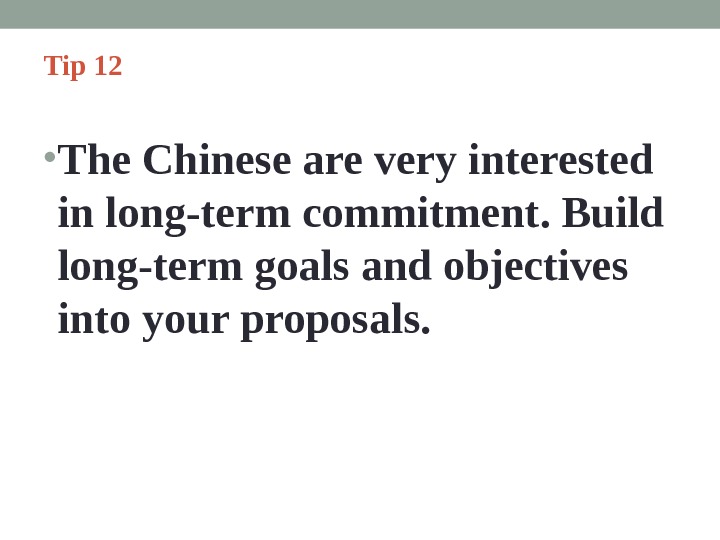

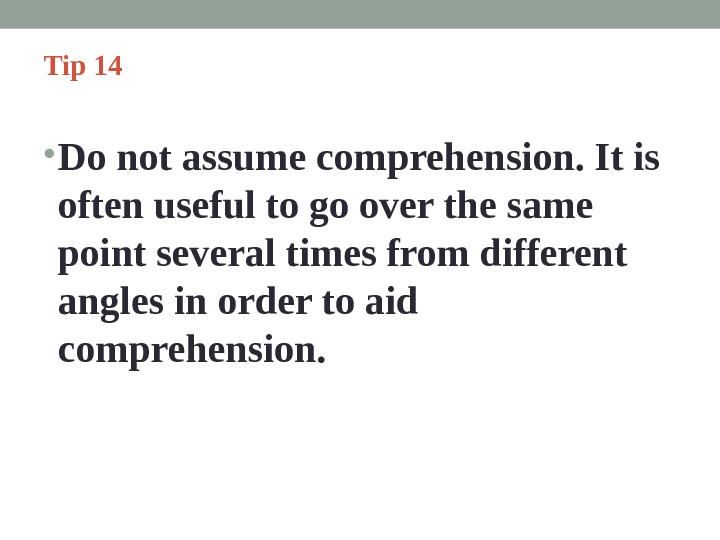




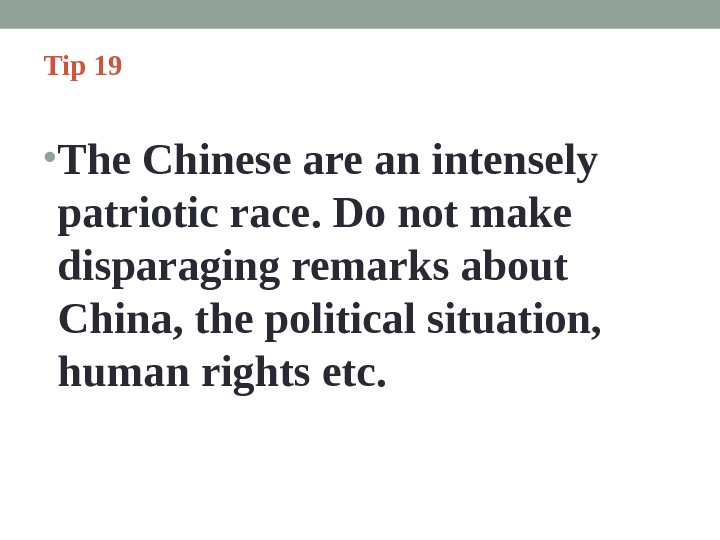



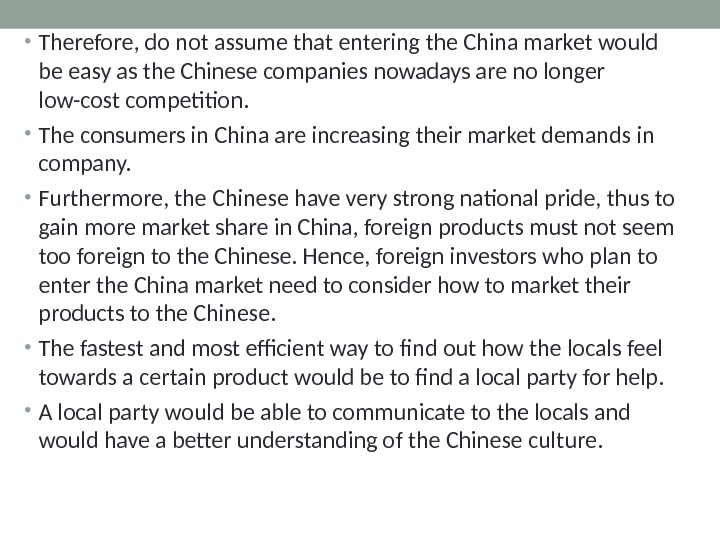
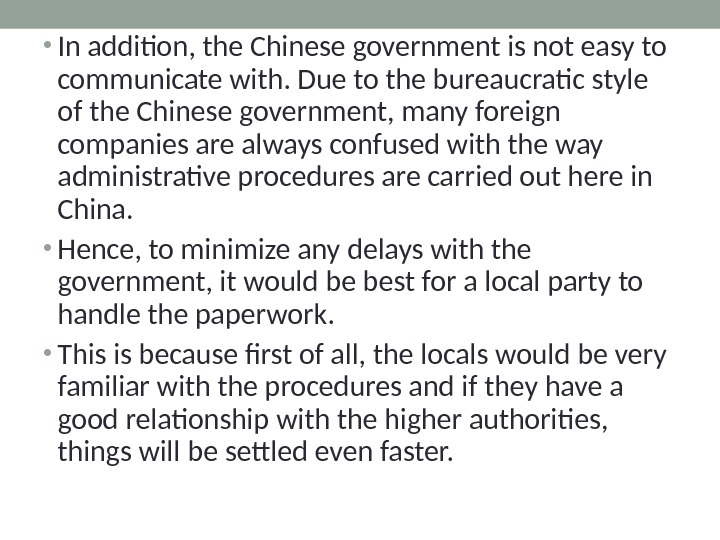













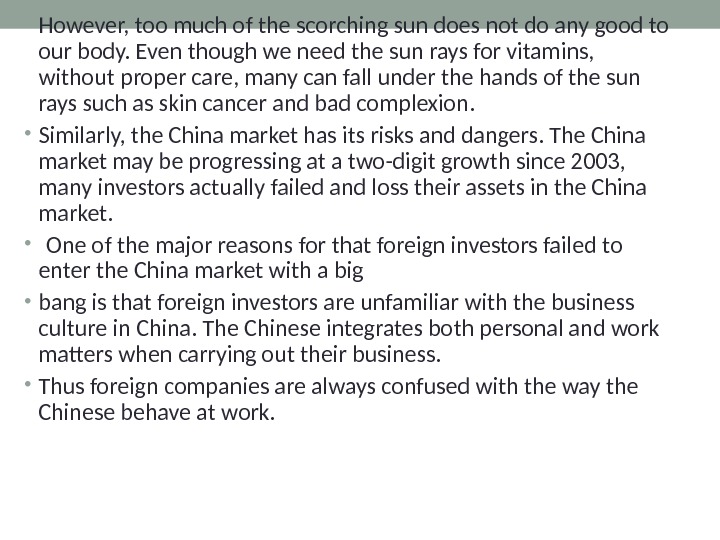
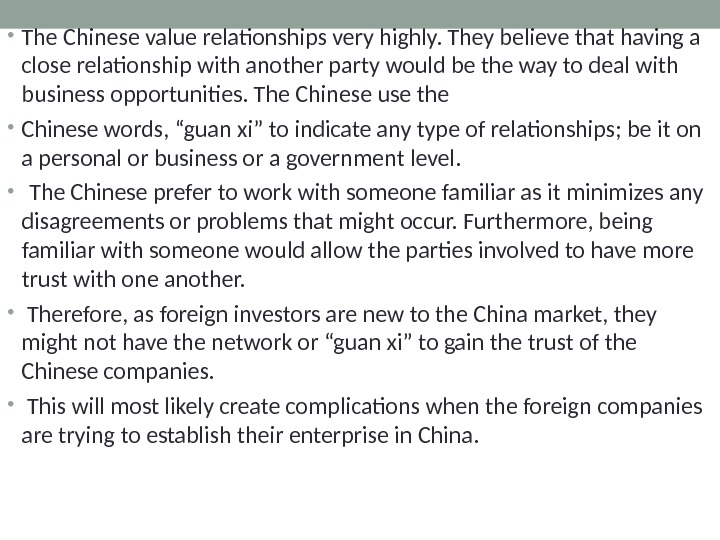
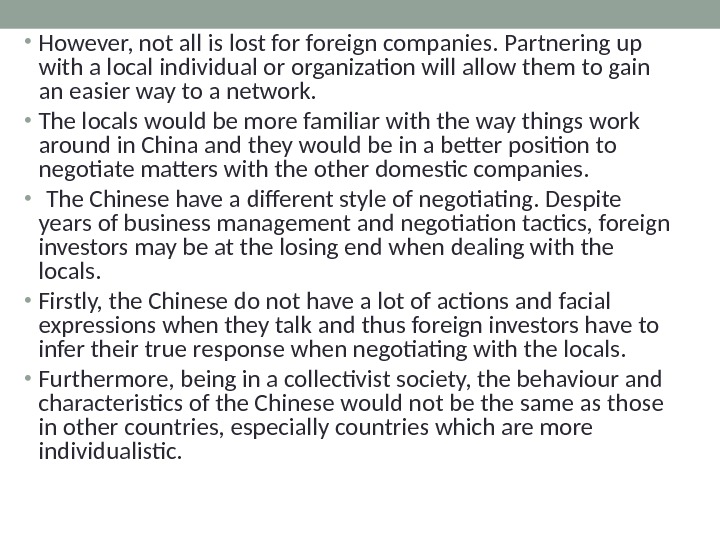






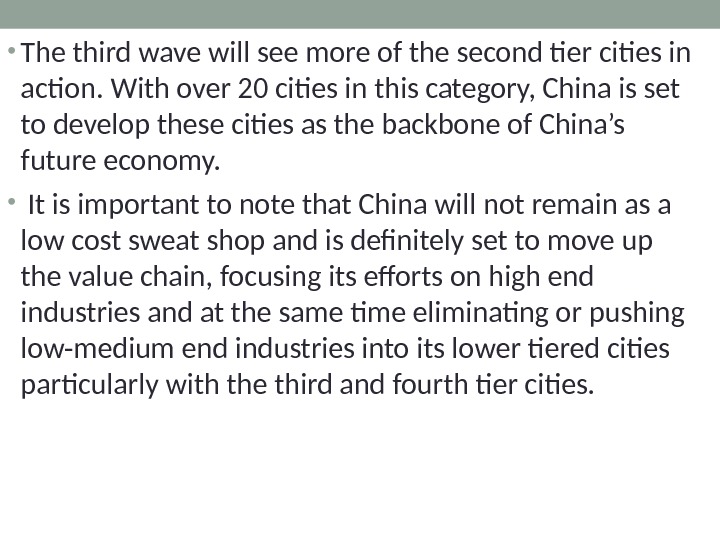



















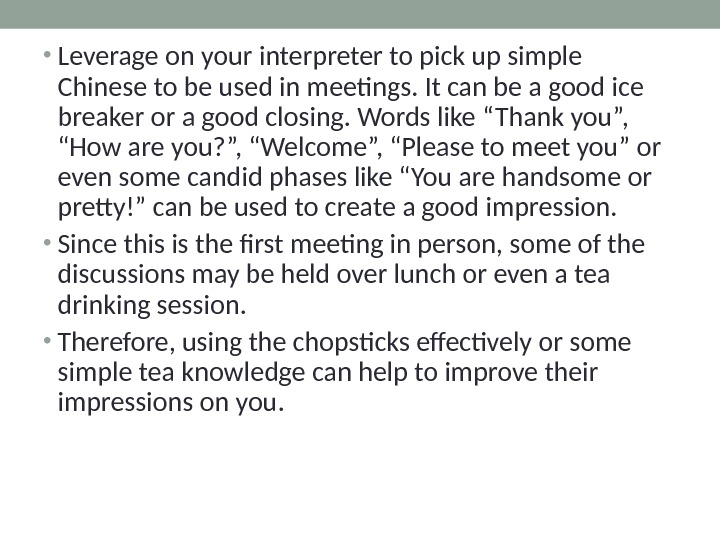

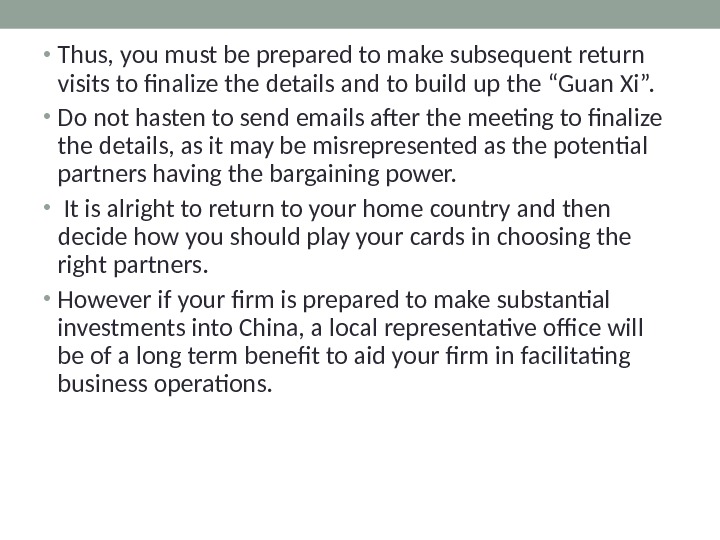








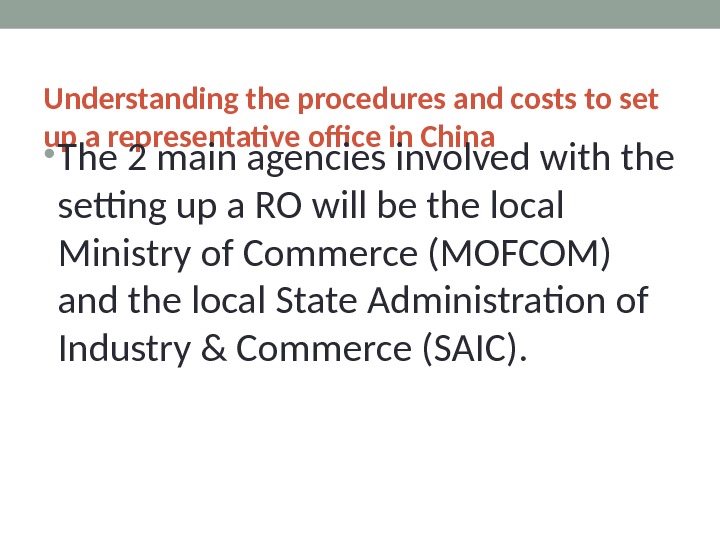
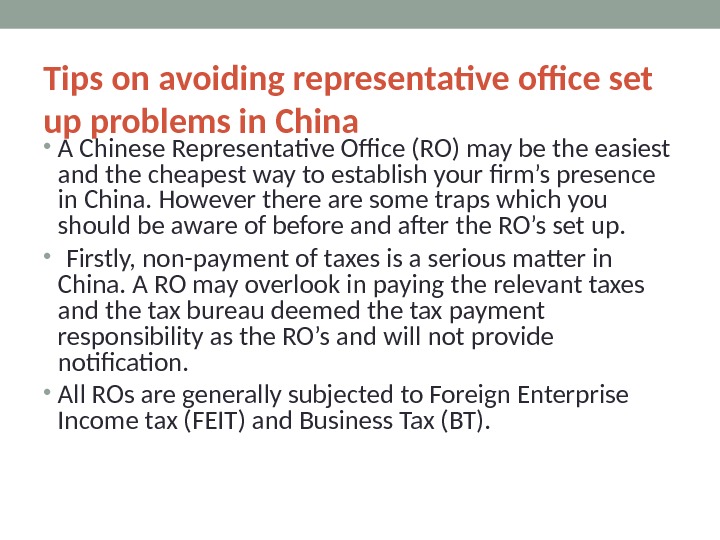













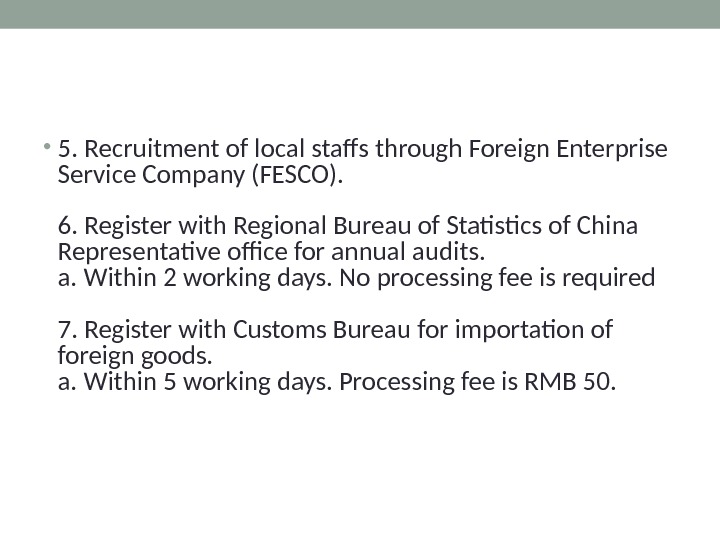



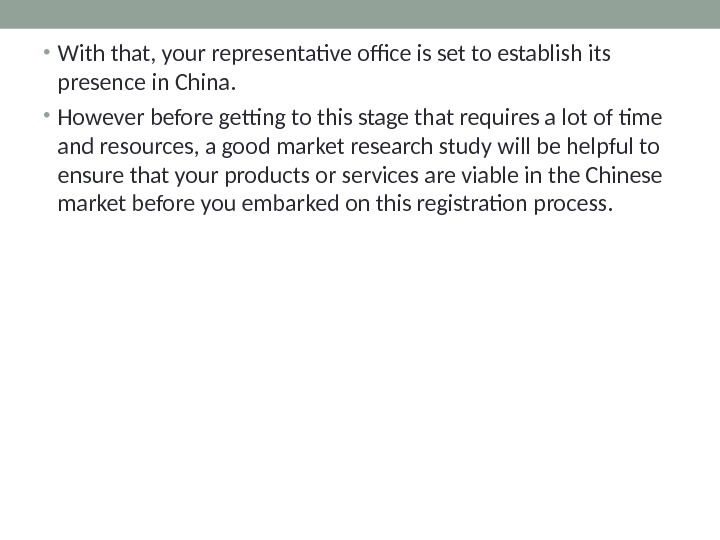

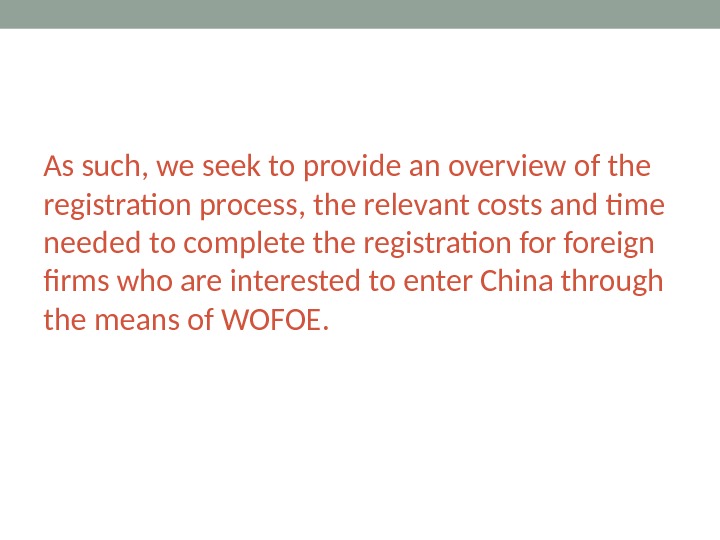






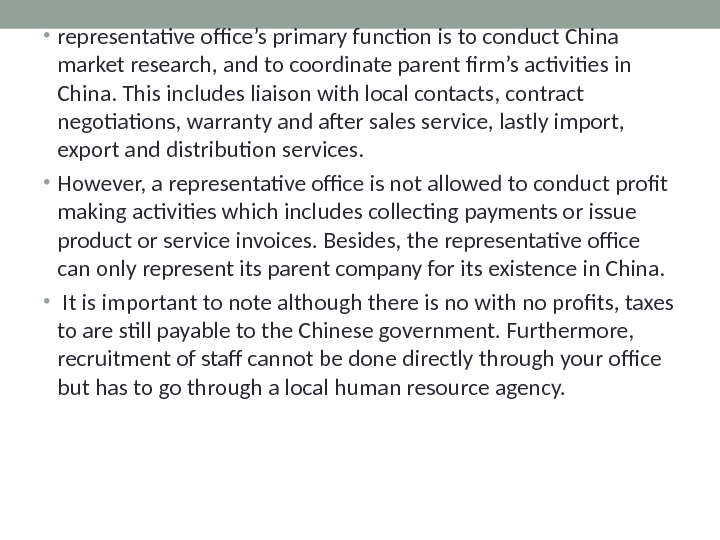



mingxia_zhu_lecture_3_marketing_in_china.ppt
- Размер: 674.5 Кб
- Количество слайдов: 142
Описание презентации Lecture 4 Marketing in China Part 1 по слайдам
 Lecture 4 Marketing in China
Lecture 4 Marketing in China
 Part 1 CHINA MARKET BACKGROUN
Part 1 CHINA MARKET BACKGROUN
 MARKET BACKGROUND • China has 1. 3 billion people, largest country in the world. • It has become the new economic superpower in Asia, challenging the pre-eminence of Japan. Marketing in China 10 —
MARKET BACKGROUND • China has 1. 3 billion people, largest country in the world. • It has become the new economic superpower in Asia, challenging the pre-eminence of Japan. Marketing in China 10 —
 MARKET BACKGROUND (CONT’D) • In 2003, China overtook Japan to become 2 nd largest world economy (on PPP basis) • The growth rate of the economy has been around 10% annually for the last several years. • China became a WTO member in December 2001 • The policy towards Hong Kong, its new territory since the 1997 takeover, has been relatively «hands-off. “ Marketing in China 10 —
MARKET BACKGROUND (CONT’D) • In 2003, China overtook Japan to become 2 nd largest world economy (on PPP basis) • The growth rate of the economy has been around 10% annually for the last several years. • China became a WTO member in December 2001 • The policy towards Hong Kong, its new territory since the 1997 takeover, has been relatively «hands-off. “ Marketing in China 10 —
 ENTRY BARRIERS • Import license controls – the Ministry of Foreign Trade & Economic Cooperation (MOFTEC) is the main regulatory organization • Protective tariffs – with WTO entry, tariff reduction gradually in place • Foreign exchange control – new exchange rate system since 1994 Marketing in China 10 —
ENTRY BARRIERS • Import license controls – the Ministry of Foreign Trade & Economic Cooperation (MOFTEC) is the main regulatory organization • Protective tariffs – with WTO entry, tariff reduction gradually in place • Foreign exchange control – new exchange rate system since 1994 Marketing in China 10 —
 TRADE REGIONS • SPECIAL ECONOMIC ZONES (SEZ’s) to attract foreign investment in production for export are still the centers foreign businesses. • These areas are Shenzen, Zhuhai, Shantou, Xiamen, Hainen, & Pudong New Area in Shanghai • Corporate tax rate in SEZs is only 15% versus 33% national rate • Some zones have additional tax exemptions • Piracy and counterfeits still prevalent Marketing in China 10 —
TRADE REGIONS • SPECIAL ECONOMIC ZONES (SEZ’s) to attract foreign investment in production for export are still the centers foreign businesses. • These areas are Shenzen, Zhuhai, Shantou, Xiamen, Hainen, & Pudong New Area in Shanghai • Corporate tax rate in SEZs is only 15% versus 33% national rate • Some zones have additional tax exemptions • Piracy and counterfeits still prevalent Marketing in China 10 —
 HONG KONG’S ROLE • HK handover had little impact on economic policy – so far. • Many western firms enter China through HK, where sophisticated HK trading companies are familiar with western business practices • Joint ventures with Chinese partners usually done through HK intermediaries. • Gradually, however, as more experience is gained, Western companies are moving beyond Hong Kong, dealing with mainland China directly. Marketing in China 10 —
HONG KONG’S ROLE • HK handover had little impact on economic policy – so far. • Many western firms enter China through HK, where sophisticated HK trading companies are familiar with western business practices • Joint ventures with Chinese partners usually done through HK intermediaries. • Gradually, however, as more experience is gained, Western companies are moving beyond Hong Kong, dealing with mainland China directly. Marketing in China 10 —
 PART 2 STP MARKETING STRATEGIES
PART 2 STP MARKETING STRATEGIES
 MARKET SEGMENTATION • Geographic region. E. g. four regions: Eastern China (with Shanghai as the center), Northern China (Beijing the center), Southern China (with Guangzhou as the center) and Western China (with Chengdu as the center). • Languages & dialects, food and drink preferences, and even ethnic roots vary across the regions. • Urban/rural split in the typical emerging market pattern, weak infrastructure in rural areas. • Emerging middle class, rise in per capita income most rapid in Shanghai, Beijing, Guangzhou 10 —
MARKET SEGMENTATION • Geographic region. E. g. four regions: Eastern China (with Shanghai as the center), Northern China (Beijing the center), Southern China (with Guangzhou as the center) and Western China (with Chengdu as the center). • Languages & dialects, food and drink preferences, and even ethnic roots vary across the regions. • Urban/rural split in the typical emerging market pattern, weak infrastructure in rural areas. • Emerging middle class, rise in per capita income most rapid in Shanghai, Beijing, Guangzhou 10 —
 MARKET TARGETING • Chinese talk about «Four big things» (shi da zen), the four products everyone aspires to. In the 1970 s, they were a bicycle, a black & white television set, a refrigerator, and a washing machine. In the 1990 s they have become a video camera, a CD hi-fi system, a personal computer, and an air conditioner. Now, a car and a cell-phone are added, as the Chinese become world-class consumers. • Teenagers/college age people represent the Chinese version of the global youth segment. 10 —
MARKET TARGETING • Chinese talk about «Four big things» (shi da zen), the four products everyone aspires to. In the 1970 s, they were a bicycle, a black & white television set, a refrigerator, and a washing machine. In the 1990 s they have become a video camera, a CD hi-fi system, a personal computer, and an air conditioner. Now, a car and a cell-phone are added, as the Chinese become world-class consumers. • Teenagers/college age people represent the Chinese version of the global youth segment. 10 —
 • Global brands confer status. Domestic products still suffer from negative image. • Need to accommodate translation of brand names. Coca Cola had to change its original transliteration from one meaning «dry mouth full of wax» to one signifying «happiness in the mouth» when read and spoken. • Foreign competition in sales promotion, after-sale service, product delivery, and price. • Quality differences between foreign companies are perceived as small. • Consumers are brand loyal, making for definite first-mover advantages. PRODUCT POSITIONING 10 —
• Global brands confer status. Domestic products still suffer from negative image. • Need to accommodate translation of brand names. Coca Cola had to change its original transliteration from one meaning «dry mouth full of wax» to one signifying «happiness in the mouth» when read and spoken. • Foreign competition in sales promotion, after-sale service, product delivery, and price. • Quality differences between foreign companies are perceived as small. • Consumers are brand loyal, making for definite first-mover advantages. PRODUCT POSITIONING 10 —
 PART 3 MARKETING MIX-4 P’s
PART 3 MARKETING MIX-4 P’s
 PRODUCT POLICIES • Quality gap between foreign & local products still large • High tariffs make it hard foreign brands to compete with lower quality domestic brands • For most Chinese, acquiring foreign made products are a novel experience 10 —
PRODUCT POLICIES • Quality gap between foreign & local products still large • High tariffs make it hard foreign brands to compete with lower quality domestic brands • For most Chinese, acquiring foreign made products are a novel experience 10 —
 • Chinese are very price-sensitive consumers (due to low income and due to habit) • Prices still high for imported products • Low priced- products have an inherently assumed low quality PRICING
• Chinese are very price-sensitive consumers (due to low income and due to habit) • Prices still high for imported products • Low priced- products have an inherently assumed low quality PRICING
 DISTRIBUTION • National product roll-outs close to impossible due to large size and weak infrastructure • Most channels are government run • Most department stores are state-owned • Personal contacts (guanxi) play an important role in transactions 10 —
DISTRIBUTION • National product roll-outs close to impossible due to large size and weak infrastructure • Most channels are government run • Most department stores are state-owned • Personal contacts (guanxi) play an important role in transactions 10 —
 • Advertising still strictly controlled by government • Media penetration is weak (e. g. TV) • Advertised products are not considered counterfeit • Print & outdoor ads & in-store promotions play a large role PROMOTION
• Advertising still strictly controlled by government • Media penetration is weak (e. g. TV) • Advertised products are not considered counterfeit • Print & outdoor ads & in-store promotions play a large role PROMOTION
 • If you don’t like it, go somewhere else. • Ask someone else. • Take a taxi if you don’t like the bus. • I don’t care whom you complain to. • If you’re not buying, what are you looking at? • Buy it if you can afford it, otherwise get out of here. • Are you buying or not? Have you made up your mind? • Don’t you see I’m busy? What’s the hurry? • I just told you. Why are you asking again? • Why didn’t you choose well when you bought it? Go ask the person who sold it to you. Service in the new China: Outlawed comments 10 —
• If you don’t like it, go somewhere else. • Ask someone else. • Take a taxi if you don’t like the bus. • I don’t care whom you complain to. • If you’re not buying, what are you looking at? • Buy it if you can afford it, otherwise get out of here. • Are you buying or not? Have you made up your mind? • Don’t you see I’m busy? What’s the hurry? • I just told you. Why are you asking again? • Why didn’t you choose well when you bought it? Go ask the person who sold it to you. Service in the new China: Outlawed comments 10 —
 Part 4 Marketing skills
Part 4 Marketing skills
 1. How to determine that there is a market for our product in China? • The one word answer is: Research. • As China’s economy develops, different markets are emerging — even different economies within the market. • For example, Shanghai bears little resemblance to the poor areas of the northwest. • Each potential market needs to be carefully researched upon which China market entry strategies can be developed. • A comprehensive is your foundation for a flourishing business in China and reduce your risks substantially in China market entry.
1. How to determine that there is a market for our product in China? • The one word answer is: Research. • As China’s economy develops, different markets are emerging — even different economies within the market. • For example, Shanghai bears little resemblance to the poor areas of the northwest. • Each potential market needs to be carefully researched upon which China market entry strategies can be developed. • A comprehensive is your foundation for a flourishing business in China and reduce your risks substantially in China market entry.
 2. Do you need a China market entry strategy? • Forward-thinking companies recognize that success rests on the need for a cohesive market entry strategy. This requires a proper understanding of China’s particular business culture and practices through China market research. • China, of course, is not one big market but a myriad of diverse and expanding markets. Each sector has its own particular attributes. Each business is different. • Many companies who are interested in China market entry have experienced frustration and bureaucratic delay, frequently resulting from ineffective communications, inappropriate relationships and a general failure to comprehend what motivates the Chinese marketplace. • Companies that have yet to gain a foothold in the country face a number of issue and challenges
2. Do you need a China market entry strategy? • Forward-thinking companies recognize that success rests on the need for a cohesive market entry strategy. This requires a proper understanding of China’s particular business culture and practices through China market research. • China, of course, is not one big market but a myriad of diverse and expanding markets. Each sector has its own particular attributes. Each business is different. • Many companies who are interested in China market entry have experienced frustration and bureaucratic delay, frequently resulting from ineffective communications, inappropriate relationships and a general failure to comprehend what motivates the Chinese marketplace. • Companies that have yet to gain a foothold in the country face a number of issue and challenges
 3. Where do we start in a country this size? • Indeed, China’s population size of 1. 3 billion is overwhelming. • Further investigation reveals that there approximately 200 million comfortable, middle class Chinese consumers. • Beijing, Shanghai and Guangzhou are three leading Chinese cities which may be considered as first priority in China market entry • however there are many additional high population cities with substantial middle income populations
3. Where do we start in a country this size? • Indeed, China’s population size of 1. 3 billion is overwhelming. • Further investigation reveals that there approximately 200 million comfortable, middle class Chinese consumers. • Beijing, Shanghai and Guangzhou are three leading Chinese cities which may be considered as first priority in China market entry • however there are many additional high population cities with substantial middle income populations
 4. How do we find a potential partner? How do we know how good that partner really is? • Guangzhou Trade Fair • Exhibitions • Internet • Ministry of Commerce • Friends
4. How do we find a potential partner? How do we know how good that partner really is? • Guangzhou Trade Fair • Exhibitions • Internet • Ministry of Commerce • Friends
 Selecting the right local distribution partners in China • One of the fastest and less risky ways to enter the China market is to leverage on Chinese distributors to sell your products in China. However, your market success will be highly dependent on the distributor to do the right things in right way. • Therefore the first step is to select the right distribution partner who can support your market entry to China. Sourcing for potential distributors can be done in various means. • Firstly, through recommendations from another firm already established in China, trade shows in China, established matching websites or lastly through Chinese market research consulting firms.
Selecting the right local distribution partners in China • One of the fastest and less risky ways to enter the China market is to leverage on Chinese distributors to sell your products in China. However, your market success will be highly dependent on the distributor to do the right things in right way. • Therefore the first step is to select the right distribution partner who can support your market entry to China. Sourcing for potential distributors can be done in various means. • Firstly, through recommendations from another firm already established in China, trade shows in China, established matching websites or lastly through Chinese market research consulting firms.
 • In the past, foreign firms can appoint Hong Kong distributors to act as their distributors in China. Furthermore, payment may be easier to transfer out of Hong Kong, but with China being more open, there is more incentive to go straight into China then to Hong Kong. • It is important to note that most distributors do not have nationwide distribution coverage but rather on a regional basis with Bohai Gulf, Yangtze River Delta and the Pearl River Delta as the commercial regional centres. • For instance, Bohai Gulf — cover the cities of Beijing, Tianjin and the provinces of Liaoning, Shandong and Hebei. •
• In the past, foreign firms can appoint Hong Kong distributors to act as their distributors in China. Furthermore, payment may be easier to transfer out of Hong Kong, but with China being more open, there is more incentive to go straight into China then to Hong Kong. • It is important to note that most distributors do not have nationwide distribution coverage but rather on a regional basis with Bohai Gulf, Yangtze River Delta and the Pearl River Delta as the commercial regional centres. • For instance, Bohai Gulf — cover the cities of Beijing, Tianjin and the provinces of Liaoning, Shandong and Hebei. •
 Factors as a reference for a good distributor • 1. A strong and stable financial background • 2. Quality sales staffs / English speaking staffs • 3. Shows enthusiasm for your products • 4. Strong relationship with an import/export agency • 5. Right business direction for its distributorship • 6. Appropriate storage of your products
Factors as a reference for a good distributor • 1. A strong and stable financial background • 2. Quality sales staffs / English speaking staffs • 3. Shows enthusiasm for your products • 4. Strong relationship with an import/export agency • 5. Right business direction for its distributorship • 6. Appropriate storage of your products
 • In your visit to China to meet the potential distributors, you may wish to check out the kind and the number of distribution points or outlets it covers, their marketing abilities and their after sales service support. • You may consider having a different distributor covering each region with different marketing strategies involving pricing and marketing channels. • It is of most importance that the distribution contract is detailed and understood due to a lack Chinese law in relation to supplier and distributor partnership. • Contracts signed in China are often in Chinese. It is safer to have a qualified law firm review any translated documents or even English ones especially with contracts.
• In your visit to China to meet the potential distributors, you may wish to check out the kind and the number of distribution points or outlets it covers, their marketing abilities and their after sales service support. • You may consider having a different distributor covering each region with different marketing strategies involving pricing and marketing channels. • It is of most importance that the distribution contract is detailed and understood due to a lack Chinese law in relation to supplier and distributor partnership. • Contracts signed in China are often in Chinese. It is safer to have a qualified law firm review any translated documents or even English ones especially with contracts.
 5. What types of difficulties have foreign companies encount ered in Chinese market entry? • Language • Cultural issues • China’s size is daunting, especially when coupled with difficult travel and communications. • Bureaucracy • The split between central planning market and the free market produces inconsistency resulting in referrals from one department to another in the search of finding the right person to contact and the right procedure.
5. What types of difficulties have foreign companies encount ered in Chinese market entry? • Language • Cultural issues • China’s size is daunting, especially when coupled with difficult travel and communications. • Bureaucracy • The split between central planning market and the free market produces inconsistency resulting in referrals from one department to another in the search of finding the right person to contact and the right procedure.
 6. What are some of the current particular obstacles? • Non-tariff measures frustrate foreigners trying to do business in China. • Quotas, some of them not even published, are slapped on many imports. • Quality inspection is tougher foreign-made goods. • Even if the goods are allowed into the country, they are at the mercy of state-run-distributors. • The complexity and difficulty of the situation is highly fluid. It requires continual monitoring in order to have the most appropriate connection to neutralize the negative impact of bureaucratic action or inaction.
6. What are some of the current particular obstacles? • Non-tariff measures frustrate foreigners trying to do business in China. • Quotas, some of them not even published, are slapped on many imports. • Quality inspection is tougher foreign-made goods. • Even if the goods are allowed into the country, they are at the mercy of state-run-distributors. • The complexity and difficulty of the situation is highly fluid. It requires continual monitoring in order to have the most appropriate connection to neutralize the negative impact of bureaucratic action or inaction.
 7. Which is better — an agent or a distributor as means of China market entry? • It depends on the circumstances and what you are trying to achieve. Considerations include: • Who are the agents with access to your target customers? • What are your existing operations and how can the new intermediary fit with them? For example, if you want to keep an existing sales operation, you will need an intermediary who is happy to work alongside with that. • What rights and responsibilities do you want to be included in your agreement with the intermediary? • How closely do you want to be involved in the sales process? It can be easier to have more control over how an agent handles sales. • What type of relationship do you want to have with the end user? Using a distributor may distance you from the ultimate customer.
7. Which is better — an agent or a distributor as means of China market entry? • It depends on the circumstances and what you are trying to achieve. Considerations include: • Who are the agents with access to your target customers? • What are your existing operations and how can the new intermediary fit with them? For example, if you want to keep an existing sales operation, you will need an intermediary who is happy to work alongside with that. • What rights and responsibilities do you want to be included in your agreement with the intermediary? • How closely do you want to be involved in the sales process? It can be easier to have more control over how an agent handles sales. • What type of relationship do you want to have with the end user? Using a distributor may distance you from the ultimate customer.
 8. Can I give an agent exclusive rights to a particular territory in China? • Yes. An agent may well want to negotiate exclusive rights to the territory. • If you also wish to be able to sell through other channels such as through you website or via mail order, you will need to ensure that your agreement with the agent allows this.
8. Can I give an agent exclusive rights to a particular territory in China? • Yes. An agent may well want to negotiate exclusive rights to the territory. • If you also wish to be able to sell through other channels such as through you website or via mail order, you will need to ensure that your agreement with the agent allows this.
 9. How much control do I have over what my agent does? • The degree of control you have will depend on what has been agreed. • For example, you can agree what products can be offered, what contract terms will be offered to customers and so on. You can also agree how the agent should approach customers and so on. However, if you exert too much control in this way, you may find that you inadvertently create an employment relationship with the agent. • Your agreement should clearly spell out the extent of the authority the agent has to act on your behalf. • Be aware, however, that if the agent exceeds that authority, and you go along with it, you may well have effectively given the agent authority to act in that way in future. • For example, if the agent arranges a sale without authority, and you then agree to fulfill the sale contract.
9. How much control do I have over what my agent does? • The degree of control you have will depend on what has been agreed. • For example, you can agree what products can be offered, what contract terms will be offered to customers and so on. You can also agree how the agent should approach customers and so on. However, if you exert too much control in this way, you may find that you inadvertently create an employment relationship with the agent. • Your agreement should clearly spell out the extent of the authority the agent has to act on your behalf. • Be aware, however, that if the agent exceeds that authority, and you go along with it, you may well have effectively given the agent authority to act in that way in future. • For example, if the agent arranges a sale without authority, and you then agree to fulfill the sale contract.
 10. How can I protect my intellectual property and confidential information? • Your agreement should spell out what use the distributor is allowed to make of your trademarks and other intellectual property. • For example, the agreement may include that the distributor is prohibited from altering your product packaging. Unless your agreement is carefully drafted, there can be unintended consequences — for example, the distributor may become entitled to some of the value of the intellectual property. • Confidential information can be protected with suitable terms in the agreement. These will need to be included in the agreement on how confidential information will be protected after the distribution relationship is terminated
10. How can I protect my intellectual property and confidential information? • Your agreement should spell out what use the distributor is allowed to make of your trademarks and other intellectual property. • For example, the agreement may include that the distributor is prohibited from altering your product packaging. Unless your agreement is carefully drafted, there can be unintended consequences — for example, the distributor may become entitled to some of the value of the intellectual property. • Confidential information can be protected with suitable terms in the agreement. These will need to be included in the agreement on how confidential information will be protected after the distribution relationship is terminated
 Part 5 Tips to invest and do business in China
Part 5 Tips to invest and do business in China
 Tip 1 • Guanxi, or personal relationships are of vital importance when doing business in China. Do not underestimate the importance of the relationship building process.
Tip 1 • Guanxi, or personal relationships are of vital importance when doing business in China. Do not underestimate the importance of the relationship building process.
 Tip 2 • People are comfortable building relationships with honourable people who show respect to those to whom respect is due.
Tip 2 • People are comfortable building relationships with honourable people who show respect to those to whom respect is due.
 Tip 3 • As all relationships are unequal it is important, if you wish to appear honourable, to show respect to age, seniority and educational background.
Tip 3 • As all relationships are unequal it is important, if you wish to appear honourable, to show respect to age, seniority and educational background.
 Tip 4 • Managers tend to be directive, which reflects basic Confucian concepts of the hierarchical nature of society.
Tip 4 • Managers tend to be directive, which reflects basic Confucian concepts of the hierarchical nature of society.
 Tip 5 • In return for loyalty, the boss is expected to show consideration and interest in all aspects of a subordinates’ life.
Tip 5 • In return for loyalty, the boss is expected to show consideration and interest in all aspects of a subordinates’ life.
 Tip 6 • There are often close relationships between senior management of a company and local party officials.
Tip 6 • There are often close relationships between senior management of a company and local party officials.
 Tip 7 • It is important that you do not make people ‘lose face’ in front of their group. Always respect seniority and do not openly disagree with people.
Tip 7 • It is important that you do not make people ‘lose face’ in front of their group. Always respect seniority and do not openly disagree with people.
 Tip 8 • Do as many favours for people as possible — debts must always be repaid.
Tip 8 • Do as many favours for people as possible — debts must always be repaid.
 Tip 9 • Business cards should be formally exchanged at the beginning of meetings. Treat the business card with great respect, as the card is the man.
Tip 9 • Business cards should be formally exchanged at the beginning of meetings. Treat the business card with great respect, as the card is the man.
 Tip 10 • Meetings are often long and seemingly without clear objectives. Very often the meeting is an exercise in relationship-building and the aim of the meeting is to move the relationship, rather than any specific business task, forward.
Tip 10 • Meetings are often long and seemingly without clear objectives. Very often the meeting is an exercise in relationship-building and the aim of the meeting is to move the relationship, rather than any specific business task, forward.
 Tip 11 • It can take several, very long meetings before any tangible progress is made. Patience is essential if you wish to capitalise on the situation.
Tip 11 • It can take several, very long meetings before any tangible progress is made. Patience is essential if you wish to capitalise on the situation.
 Tip 12 • The Chinese are very interested in long-term commitment. Build long-term goals and objectives into your proposals.
Tip 12 • The Chinese are very interested in long-term commitment. Build long-term goals and objectives into your proposals.
 Tip 13 • Do not be too direct. Strive for diplomacy, consensus and harmony. Remember that this takes time to achieve.
Tip 13 • Do not be too direct. Strive for diplomacy, consensus and harmony. Remember that this takes time to achieve.
 Tip 14 • Do not assume comprehension. It is often useful to go over the same point several times from different angles in order to aid comprehension.
Tip 14 • Do not assume comprehension. It is often useful to go over the same point several times from different angles in order to aid comprehension.
 Tip 15 • It is difficult for the Chinese to say ‘no’ directly. Anything other than a direct ‘yes’ could mean ‘no’. • Be circumspect and reflect on seeming agreements reached. Has an agreement actually been reached?
Tip 15 • It is difficult for the Chinese to say ‘no’ directly. Anything other than a direct ‘yes’ could mean ‘no’. • Be circumspect and reflect on seeming agreements reached. Has an agreement actually been reached?
 Tip 16 • It is difficult to read body language as, by western standards, it is somewhat muted in China. Be very alive to any changes of posture, animation etc.
Tip 16 • It is difficult to read body language as, by western standards, it is somewhat muted in China. Be very alive to any changes of posture, animation etc.
 Tip 17 • Gift giving is an everyday part of Chinese business culture. Giving and receiving gifts helps to cement relationships. Take gifts with you when visiting and put some thought and effort into the gift selection process.
Tip 17 • Gift giving is an everyday part of Chinese business culture. Giving and receiving gifts helps to cement relationships. Take gifts with you when visiting and put some thought and effort into the gift selection process.
 Tip 18 • Always wrap gifts before giving them. Gifts are rarely opened in front of the giver.
Tip 18 • Always wrap gifts before giving them. Gifts are rarely opened in front of the giver.
 Tip 19 • The Chinese are an intensely patriotic race. Do not make disparaging remarks about China, the political situation, human rights etc.
Tip 19 • The Chinese are an intensely patriotic race. Do not make disparaging remarks about China, the political situation, human rights etc.
 Tip 20 • Entertaining is very important in the relationship building process. If entertaining, do it well. If being entertained at a banquet, take you lead from your hosts — they will enjoy taking you through the process. •
Tip 20 • Entertaining is very important in the relationship building process. If entertaining, do it well. If being entertained at a banquet, take you lead from your hosts — they will enjoy taking you through the process. •
 Tips to invest and do business in China • The amount of foreign investors is saturating the China market each year. Walking down the streets in Beijing, one can see a whole array of stores displaying a multitude of global products. • The obvious scene of foreign or global companies entering into the China market indicates the saturation of foreign investment in China. • Over the years, China has attracted the most amount of foreign investors compared to any other countries.
Tips to invest and do business in China • The amount of foreign investors is saturating the China market each year. Walking down the streets in Beijing, one can see a whole array of stores displaying a multitude of global products. • The obvious scene of foreign or global companies entering into the China market indicates the saturation of foreign investment in China. • Over the years, China has attracted the most amount of foreign investors compared to any other countries.
 • As foreign investors enter into China, the domestic industry has been benefiting as well. While working with the foreign companies, the domestic companies have increased in their technology and marketing tactics. • Thus, the China market will be more competitive each year as the domestic industry increases their brand equity and the increase of foreign giants entering into China.
• As foreign investors enter into China, the domestic industry has been benefiting as well. While working with the foreign companies, the domestic companies have increased in their technology and marketing tactics. • Thus, the China market will be more competitive each year as the domestic industry increases their brand equity and the increase of foreign giants entering into China.
 • Therefore, do not assume that entering the China market would be easy as the Chinese companies nowadays are no longer low-cost competition. • The consumers in China are increasing their market demands in company. • Furthermore, the Chinese have very strong national pride, thus to gain more market share in China, foreign products must not seem too foreign to the Chinese. Hence, foreign investors who plan to enter the China market need to consider how to market their products to the Chinese. • The fastest and most efficient way to find out how the locals feel towards a certain product would be to find a local party for help. • A local party would be able to communicate to the locals and would have a better understanding of the Chinese culture.
• Therefore, do not assume that entering the China market would be easy as the Chinese companies nowadays are no longer low-cost competition. • The consumers in China are increasing their market demands in company. • Furthermore, the Chinese have very strong national pride, thus to gain more market share in China, foreign products must not seem too foreign to the Chinese. Hence, foreign investors who plan to enter the China market need to consider how to market their products to the Chinese. • The fastest and most efficient way to find out how the locals feel towards a certain product would be to find a local party for help. • A local party would be able to communicate to the locals and would have a better understanding of the Chinese culture.
 • In addition, the Chinese government is not easy to communicate with. Due to the bureaucratic style of the Chinese government, many foreign companies are always confused with the way administrative procedures are carried out here in China. • Hence, to minimize any delays with the government, it would be best for a local party to handle the paperwork. • This is because first of all, the locals would be very familiar with the procedures and if they have a good relationship with the higher authorities, things will be settled even faster.
• In addition, the Chinese government is not easy to communicate with. Due to the bureaucratic style of the Chinese government, many foreign companies are always confused with the way administrative procedures are carried out here in China. • Hence, to minimize any delays with the government, it would be best for a local party to handle the paperwork. • This is because first of all, the locals would be very familiar with the procedures and if they have a good relationship with the higher authorities, things will be settled even faster.
 • Very often, foreign companies may have problems looking for suitable Chinese partners as they do not have the necessary network here in China. • Furthermore, if foreign investors do not understand this culture, conflicts tend to arise when different decision making tools are used compared to the Chinese. • Hence, foreign companies would need to have a good grasp of the China culture before entering into the Chinese market.
• Very often, foreign companies may have problems looking for suitable Chinese partners as they do not have the necessary network here in China. • Furthermore, if foreign investors do not understand this culture, conflicts tend to arise when different decision making tools are used compared to the Chinese. • Hence, foreign companies would need to have a good grasp of the China culture before entering into the Chinese market.
 Complications of the China market • The China market is increasing over the years and many foreign companies are considering • about entering into China. However, many have heard about the downside of failed China market entry and are worried about the complications of the China market. • But as long foreign investors learn and understand more about the Chinese business culture and the local competitors, they would be able to develop a strategy to counter problems that they might face when entering the China market.
Complications of the China market • The China market is increasing over the years and many foreign companies are considering • about entering into China. However, many have heard about the downside of failed China market entry and are worried about the complications of the China market. • But as long foreign investors learn and understand more about the Chinese business culture and the local competitors, they would be able to develop a strategy to counter problems that they might face when entering the China market.
 • For a successful partnership, both parties need to go the extra mile to learn more about each other culturally and their business styles. • The Chinese are not difficult to work with. As long as we are familiar with the way they work and their style of negotiation, overseas companies can collaborate with local organizations and expand their enterprise into the China market. • Since the China market consists of mainly local organizations, overseas companies would need to have contacts among the locals to enter into the China market.
• For a successful partnership, both parties need to go the extra mile to learn more about each other culturally and their business styles. • The Chinese are not difficult to work with. As long as we are familiar with the way they work and their style of negotiation, overseas companies can collaborate with local organizations and expand their enterprise into the China market. • Since the China market consists of mainly local organizations, overseas companies would need to have contacts among the locals to enter into the China market.
 Part 6 Suggestions on how overseas companies can work effectively with the locals in China
Part 6 Suggestions on how overseas companies can work effectively with the locals in China
 1. Chinese Business Culture • Many foreign investors find it very frustrating to work with the Chinese because firstly they do not understand the Chinese language and culture, and secondly they feel that the Chinese have a different sense of business style. • Language barriers cause conflicts and miscommunications among the parties. Thus, foreign investors to successfully enter into China market, they would need to be able to communicate and negotiate with the locals.
1. Chinese Business Culture • Many foreign investors find it very frustrating to work with the Chinese because firstly they do not understand the Chinese language and culture, and secondly they feel that the Chinese have a different sense of business style. • Language barriers cause conflicts and miscommunications among the parties. Thus, foreign investors to successfully enter into China market, they would need to be able to communicate and negotiate with the locals.
 • The people in China have a strong national and culture pride thus it is of no surprise that the Chinese tend to carry out their business according to their beliefs and values. For example, the Chinese places a high importance on respect in society. Hence, at the workplace, the Chinese have a high respect for their superiors and their co-workers. Thus, foreign investors would need • to recognize that they need to be respectful when talking to the Chinese during business meetings. If the Chinese feel that the foreigners are unknowingly disrespectful, the foreign company may not be able to strike a deal with the locals.
• The people in China have a strong national and culture pride thus it is of no surprise that the Chinese tend to carry out their business according to their beliefs and values. For example, the Chinese places a high importance on respect in society. Hence, at the workplace, the Chinese have a high respect for their superiors and their co-workers. Thus, foreign investors would need • to recognize that they need to be respectful when talking to the Chinese during business meetings. If the Chinese feel that the foreigners are unknowingly disrespectful, the foreign company may not be able to strike a deal with the locals.
 • Furthermore, the foreign companies need to understand how the Chinese carry out their business here. • As China is only an emerging market, not many companies understand the Chinese business culture. In China, the locals are very concerned about building up good relationships with their partners and clients. • Therefore, the Chinese will put in a lot of effort and time to socialize with their clients before settling on a deal. Even though the business deal might not be successful, the Chinese would still want to keep that relationship strong for future benefits.
• Furthermore, the foreign companies need to understand how the Chinese carry out their business here. • As China is only an emerging market, not many companies understand the Chinese business culture. In China, the locals are very concerned about building up good relationships with their partners and clients. • Therefore, the Chinese will put in a lot of effort and time to socialize with their clients before settling on a deal. Even though the business deal might not be successful, the Chinese would still want to keep that relationship strong for future benefits.
 2. “Guanxi” • Maintaining good relationships in China would help foreign companies in the China market. • The Chinese feel that one needs to be constantly networking in China. In China, establishing relationships with others is referred to as having “Guanxi” with people. Guanxi (relationship) is • an important element in achieving successful business in China. With a good relationship with others, a company would benefit in many different ways. First, a trust between the different parties would have long been established thus the parties would be very comfortable working • with each other. Next, if a company would to encounter any problems in any field, knowing someone who is an expert in that field would help explain matters and may even help to resolve any problems.
2. “Guanxi” • Maintaining good relationships in China would help foreign companies in the China market. • The Chinese feel that one needs to be constantly networking in China. In China, establishing relationships with others is referred to as having “Guanxi” with people. Guanxi (relationship) is • an important element in achieving successful business in China. With a good relationship with others, a company would benefit in many different ways. First, a trust between the different parties would have long been established thus the parties would be very comfortable working • with each other. Next, if a company would to encounter any problems in any field, knowing someone who is an expert in that field would help explain matters and may even help to resolve any problems.
 3. Establish close relations with government officials • Because the China government plays an important role in influencing market movement and administering foreign investments, a strong government relationship remains an important factor to do business successfully in China. • Fewer hiccups may be met during paperwork applications or achieving local authorization if a strong relationship with government officials is in place.
3. Establish close relations with government officials • Because the China government plays an important role in influencing market movement and administering foreign investments, a strong government relationship remains an important factor to do business successfully in China. • Fewer hiccups may be met during paperwork applications or achieving local authorization if a strong relationship with government officials is in place.
 4. Local competition • Foreign investors also need to find out what their local competitions are. • However, one must not overlook small local companies in the China market as the Chinese have a very strong national pride thus they tend to be more supportive towards their local rather than foreign products. • Hence, foreign companies would really need to do a detailed market and consumer research if they want to not only enter the China market but also market their products to the local market.
4. Local competition • Foreign investors also need to find out what their local competitions are. • However, one must not overlook small local companies in the China market as the Chinese have a very strong national pride thus they tend to be more supportive towards their local rather than foreign products. • Hence, foreign companies would really need to do a detailed market and consumer research if they want to not only enter the China market but also market their products to the local market.
 • Foreign investors can seek for outside help when trying to enter into the China market. The above are just some of the problems or information of the China market. • However, there are many more which most of the foreign investors are unable to handle on their own. • Approaching someone who is familiar with the China market and the Chinese culture would help tremendously as they would know the tactic on how to handle any problems.
• Foreign investors can seek for outside help when trying to enter into the China market. The above are just some of the problems or information of the China market. • However, there are many more which most of the foreign investors are unable to handle on their own. • Approaching someone who is familiar with the China market and the Chinese culture would help tremendously as they would know the tactic on how to handle any problems.
 Learn about Chinese business style • Take a look of the analogy of sun rise at dawn. As it gradually ascends, it will soon be high above, shining throughout the world. • The China market is like the sun. The opening of the China market few decades ago was just like the break of dawn, giving us light to pave our way in the morning. • Now as the China market is slowing progressing and absorbing all the economical benefits, it will soon be one of the largest economies in the world. Just like the noon sun giving light to everywhere in the earth.
Learn about Chinese business style • Take a look of the analogy of sun rise at dawn. As it gradually ascends, it will soon be high above, shining throughout the world. • The China market is like the sun. The opening of the China market few decades ago was just like the break of dawn, giving us light to pave our way in the morning. • Now as the China market is slowing progressing and absorbing all the economical benefits, it will soon be one of the largest economies in the world. Just like the noon sun giving light to everywhere in the earth.
 • China has attracted the second leading number of foreign direct investment every year ever since 1993. • Till today, millions of foreign enterprises are operating in China. Many believe that down the road, China would be the strongest market outside the big giants such as the USA and Europe.
• China has attracted the second leading number of foreign direct investment every year ever since 1993. • Till today, millions of foreign enterprises are operating in China. Many believe that down the road, China would be the strongest market outside the big giants such as the USA and Europe.
 • However, too much of the scorching sun does not do any good to our body. Even though we need the sun rays for vitamins, without proper care, many can fall under the hands of the sun rays such as skin cancer and bad complexion. • Similarly, the China market has its risks and dangers. The China market may be progressing at a two-digit growth since 2003, many investors actually failed and loss their assets in the China market. • One of the major reasons for that foreign investors failed to enter the China market with a big • bang is that foreign investors are unfamiliar with the business culture in China. The Chinese integrates both personal and work matters when carrying out their business. • Thus foreign companies are always confused with the way the Chinese behave at work.
• However, too much of the scorching sun does not do any good to our body. Even though we need the sun rays for vitamins, without proper care, many can fall under the hands of the sun rays such as skin cancer and bad complexion. • Similarly, the China market has its risks and dangers. The China market may be progressing at a two-digit growth since 2003, many investors actually failed and loss their assets in the China market. • One of the major reasons for that foreign investors failed to enter the China market with a big • bang is that foreign investors are unfamiliar with the business culture in China. The Chinese integrates both personal and work matters when carrying out their business. • Thus foreign companies are always confused with the way the Chinese behave at work.
 • The Chinese value relationships very highly. They believe that having a close relationship with another party would be the way to deal with business opportunities. The Chinese use the • Chinese words, “guan xi” to indicate any type of relationships; be it on a personal or business or a government level. • The Chinese prefer to work with someone familiar as it minimizes any disagreements or problems that might occur. Furthermore, being familiar with someone would allow the parties involved to have more trust with one another. • Therefore, as foreign investors are new to the China market, they might not have the network or “guan xi” to gain the trust of the Chinese companies. • This will most likely create complications when the foreign companies are trying to establish their enterprise in China.
• The Chinese value relationships very highly. They believe that having a close relationship with another party would be the way to deal with business opportunities. The Chinese use the • Chinese words, “guan xi” to indicate any type of relationships; be it on a personal or business or a government level. • The Chinese prefer to work with someone familiar as it minimizes any disagreements or problems that might occur. Furthermore, being familiar with someone would allow the parties involved to have more trust with one another. • Therefore, as foreign investors are new to the China market, they might not have the network or “guan xi” to gain the trust of the Chinese companies. • This will most likely create complications when the foreign companies are trying to establish their enterprise in China.
 • However, not all is lost foreign companies. Partnering up with a local individual or organization will allow them to gain an easier way to a network. • The locals would be more familiar with the way things work around in China and they would be in a better position to negotiate matters with the other domestic companies. • The Chinese have a different style of negotiating. Despite years of business management and negotiation tactics, foreign investors may be at the losing end when dealing with the locals. • Firstly, the Chinese do not have a lot of actions and facial expressions when they talk and thus foreign investors have to infer their true response when negotiating with the locals. • Furthermore, being in a collectivist society, the behaviour and characteristics of the Chinese would not be the same as those in other countries, especially countries which are more individualistic.
• However, not all is lost foreign companies. Partnering up with a local individual or organization will allow them to gain an easier way to a network. • The locals would be more familiar with the way things work around in China and they would be in a better position to negotiate matters with the other domestic companies. • The Chinese have a different style of negotiating. Despite years of business management and negotiation tactics, foreign investors may be at the losing end when dealing with the locals. • Firstly, the Chinese do not have a lot of actions and facial expressions when they talk and thus foreign investors have to infer their true response when negotiating with the locals. • Furthermore, being in a collectivist society, the behaviour and characteristics of the Chinese would not be the same as those in other countries, especially countries which are more individualistic.
 • The Chinese have a very strong national pride and are more comfortable with familiarity. One of the marketing strategies would be to target on their national pride. • As China expands its economy, the domestic market is also progressing. • The Chinese are producing higher quality products at a lower price. Thus, the domestic industry are actually gaining more market share in China and thus creating higher brand awareness. • Foreign investors who want to enter into the China market need to take not only of their competitors of the same level but smaller local enterprises who are gradually expanding.
• The Chinese have a very strong national pride and are more comfortable with familiarity. One of the marketing strategies would be to target on their national pride. • As China expands its economy, the domestic market is also progressing. • The Chinese are producing higher quality products at a lower price. Thus, the domestic industry are actually gaining more market share in China and thus creating higher brand awareness. • Foreign investors who want to enter into the China market need to take not only of their competitors of the same level but smaller local enterprises who are gradually expanding.
 Chinese frst tier cities, second tier cities and tiered cities • Years of economic reform ranged from the political relaxation of foreign direct investments to the promotion of entrepreneurship, China has emerged as one of the world’s top economies. • As such, Beijing Olympics 2008 serves as a new chapter milestone that signifies the beginning of China’s third wave of economic growth – Industrial consolidation.
Chinese frst tier cities, second tier cities and tiered cities • Years of economic reform ranged from the political relaxation of foreign direct investments to the promotion of entrepreneurship, China has emerged as one of the world’s top economies. • As such, Beijing Olympics 2008 serves as a new chapter milestone that signifies the beginning of China’s third wave of economic growth – Industrial consolidation.
 • As such, it is a good time to examine how the Chinese cities have developed according to the traditional tiered city system. If you highlight all the first and second tiered cities in China, you will understand how the Chinese government plans to develop China into the world’s largest economy. • In the 1980 s, instead of opening up the whole of China, as part of an economic risk reduction strategy decided to develop special economic zones and open up cities near the coast foreign investments.
• As such, it is a good time to examine how the Chinese cities have developed according to the traditional tiered city system. If you highlight all the first and second tiered cities in China, you will understand how the Chinese government plans to develop China into the world’s largest economy. • In the 1980 s, instead of opening up the whole of China, as part of an economic risk reduction strategy decided to develop special economic zones and open up cities near the coast foreign investments.
 • Coastal cities aid imports and exports. In addition, agglomerating the “test” cities can develop economies of scale relating to transportation infrastructure. • Furthermore, resources from western China were drawn and consolidated to support these strategically positioned coastal cities prominently for Beijing in the north, Shanghai in the midst, and Guangzhou in the south, with Shenzhen acting as a gateway from Hong Kong.
• Coastal cities aid imports and exports. In addition, agglomerating the “test” cities can develop economies of scale relating to transportation infrastructure. • Furthermore, resources from western China were drawn and consolidated to support these strategically positioned coastal cities prominently for Beijing in the north, Shanghai in the midst, and Guangzhou in the south, with Shenzhen acting as a gateway from Hong Kong.
 • As a result of shorter and improved transportation and communication infrastructure, economic development proliferates to the nearby cities, gradually moving westwards into China. • Concurrently, the Chinese government also developed pockets of economic drivers especially in different provincial capitals in order to timely introduce economic growth at different regions. • As such, cities begin their economic reform at different stages and thus with time, this became known as the Chinese tiered city system with cities given the connotation as first, second, third or fourth tier cities.
• As a result of shorter and improved transportation and communication infrastructure, economic development proliferates to the nearby cities, gradually moving westwards into China. • Concurrently, the Chinese government also developed pockets of economic drivers especially in different provincial capitals in order to timely introduce economic growth at different regions. • As such, cities begin their economic reform at different stages and thus with time, this became known as the Chinese tiered city system with cities given the connotation as first, second, third or fourth tier cities.
 • The Chinese tiered city system is characterized by the city economy scale and population size with Shanghai topping the China’s city population chart at 14 million, followed by Beijing and Guangzhou with 12 million and 8 million in 2007 respectively. • These large cities, fuelled by own domestic demand consumption provided the platform for improved living standards, better business and job opportunities and an international showcase to the rest of the world. • However, these cities now faced a population ceiling challenge with stiff business competition which may reduce high exponential growth that was seen in the past.
• The Chinese tiered city system is characterized by the city economy scale and population size with Shanghai topping the China’s city population chart at 14 million, followed by Beijing and Guangzhou with 12 million and 8 million in 2007 respectively. • These large cities, fuelled by own domestic demand consumption provided the platform for improved living standards, better business and job opportunities and an international showcase to the rest of the world. • However, these cities now faced a population ceiling challenge with stiff business competition which may reduce high exponential growth that was seen in the past.
 • The third wave will see more of the second tier cities in action. With over 20 cities in this category, China is set to develop these cities as the backbone of China’s future economy. • It is important to note that China will not remain as a low cost sweat shop and is definitely set to move up the value chain, focusing its efforts on high end industries and at the same time eliminating or pushing low-medium end industries into its lower tiered cities particularly with the third and fourth tier cities.
• The third wave will see more of the second tier cities in action. With over 20 cities in this category, China is set to develop these cities as the backbone of China’s future economy. • It is important to note that China will not remain as a low cost sweat shop and is definitely set to move up the value chain, focusing its efforts on high end industries and at the same time eliminating or pushing low-medium end industries into its lower tiered cities particularly with the third and fourth tier cities.
 • Already armed with a relatively medium to high disposable incomes and an average GDP per capita of RMB 30000, these second tiered cities provide a lucrative option for firms to apply blue ocean strategy on Chinese domestic markets. • Due to the Chinese emphasis on “Mian Zi” or “face” plus the lack of variety for luxury and branded goods in their cities, the rich and affluent from lower tiered cities often make short trips to Beijing and Shanghai for their luxury shopping. • Therefore, having your presence in the second tier cities can provide greater proximity and convenience for these target groups.
• Already armed with a relatively medium to high disposable incomes and an average GDP per capita of RMB 30000, these second tiered cities provide a lucrative option for firms to apply blue ocean strategy on Chinese domestic markets. • Due to the Chinese emphasis on “Mian Zi” or “face” plus the lack of variety for luxury and branded goods in their cities, the rich and affluent from lower tiered cities often make short trips to Beijing and Shanghai for their luxury shopping. • Therefore, having your presence in the second tier cities can provide greater proximity and convenience for these target groups.
 • China in the past 20 years is akin to a baby dragon playing around its nest, testing and trying out new ways of doing things, showing the world her head and wings. • Now it is ready to emerge more of her to the world – the backbone akin the second tiered cities.
• China in the past 20 years is akin to a baby dragon playing around its nest, testing and trying out new ways of doing things, showing the world her head and wings. • Now it is ready to emerge more of her to the world – the backbone akin the second tiered cities.
 Understand the risk of entering China market • China market is indeed a growing pool of investments, trade and production. • Many have termed China as the world’s factory where lots and companies around the world are entering into China to further expand their business. • As China continues to progress in recent years, many foreign companies in China are benefiting as well. • Today, China has attracted the most number of foreign investors compared to other developing countries.
Understand the risk of entering China market • China market is indeed a growing pool of investments, trade and production. • Many have termed China as the world’s factory where lots and companies around the world are entering into China to further expand their business. • As China continues to progress in recent years, many foreign companies in China are benefiting as well. • Today, China has attracted the most number of foreign investors compared to other developing countries.
 • China is a good opportunity for companies to embark on if they want to expand their business in Asia and the world around. • However, SMEs (small and medium enterprises) may be worried that they do not have the required or enough resources to enter into China market. • However, it is not just about having the capital but applying the correct approach when doing business in China.
• China is a good opportunity for companies to embark on if they want to expand their business in Asia and the world around. • However, SMEs (small and medium enterprises) may be worried that they do not have the required or enough resources to enter into China market. • However, it is not just about having the capital but applying the correct approach when doing business in China.
 • China market is a complicated field by which only those who are familiar with the Chinese culture would be able to move around in the market. • Many may not realize that China is a country whereby the Chinese are deal with business according to their social and cultural values. • The Chinese have been passing down a set of values since history and the Chinese companies have been carrying out their business and trade according to those values and beliefs. • Thus it takes more than just being able to speak the language.
• China market is a complicated field by which only those who are familiar with the Chinese culture would be able to move around in the market. • Many may not realize that China is a country whereby the Chinese are deal with business according to their social and cultural values. • The Chinese have been passing down a set of values since history and the Chinese companies have been carrying out their business and trade according to those values and beliefs. • Thus it takes more than just being able to speak the language.
 • To survive in the China market, one must have good relationships in the market. The Chinese uses the term, “guan xi” to refer to any kind of relationships; personally or bureaucratically. Chinese companies tend to want to work with people whom they are familiar with as they would be able to develop a trust between them. • Furthermore with “guan xi”, newly established companies would know the knitty gritty paperwork and having a good relationship with the government officials would reduce any unnecessary procedures and delays
• To survive in the China market, one must have good relationships in the market. The Chinese uses the term, “guan xi” to refer to any kind of relationships; personally or bureaucratically. Chinese companies tend to want to work with people whom they are familiar with as they would be able to develop a trust between them. • Furthermore with “guan xi”, newly established companies would know the knitty gritty paperwork and having a good relationship with the government officials would reduce any unnecessary procedures and delays
 • However, a number of foreign companies do not a good network in China and thus they are unable to find relevant or reliable business partners in China market and meet a lot bureaucratic problems as they are unfamiliar with the laws of China. • The Chinese consumers have a very strong national pride and they like to be associated with their nationality and country. Hence, the Chinese consumers are very supportive of their local products. • Hence, foreign investors sometimes have a hard time trying to market their products to the Chinese consumers because their products may seem too unfamiliar and foreign.
• However, a number of foreign companies do not a good network in China and thus they are unable to find relevant or reliable business partners in China market and meet a lot bureaucratic problems as they are unfamiliar with the laws of China. • The Chinese consumers have a very strong national pride and they like to be associated with their nationality and country. Hence, the Chinese consumers are very supportive of their local products. • Hence, foreign investors sometimes have a hard time trying to market their products to the Chinese consumers because their products may seem too unfamiliar and foreign.
 • Foreign companies need to familiarize themselves with the China market laws and culture • before entering it. The China laws may be frustrating as they seem to be very complicated. • However, if foreign companies are familiar with the Chinese culture, they will be able to understand the Chinese laws better. Interacting with the locals would also allow a deeper understanding of the Chinese culture. • Hence, a lot of foreign companies would undertake a local company as a partner to help them with the registration process and negotiation with the Chinese.
• Foreign companies need to familiarize themselves with the China market laws and culture • before entering it. The China laws may be frustrating as they seem to be very complicated. • However, if foreign companies are familiar with the Chinese culture, they will be able to understand the Chinese laws better. Interacting with the locals would also allow a deeper understanding of the Chinese culture. • Hence, a lot of foreign companies would undertake a local company as a partner to help them with the registration process and negotiation with the Chinese.
 • In addition, most of the foreigners are not exposed to the Chinese culture, thus they do not know what are the preferences and needs of the Chinese consumers. • Carrying out a consumer research may not be very useful as the information collected may not truly reflect the true responses as the Chinese may not be comfortable giving out information to foreign researches. • Hence, very often, foreign companies engage a local research company to carry out market analysis research as the data collected may be more reliable. •
• In addition, most of the foreigners are not exposed to the Chinese culture, thus they do not know what are the preferences and needs of the Chinese consumers. • Carrying out a consumer research may not be very useful as the information collected may not truly reflect the true responses as the Chinese may not be comfortable giving out information to foreign researches. • Hence, very often, foreign companies engage a local research company to carry out market analysis research as the data collected may be more reliable. •
 Problems that foreign companies may encounter when entering China market • Every market has its own risks and gains but with a clear understanding of what they are, companies can actually enter and establish a presence in the market. • With this rapid economic growth, many foreign companies are hoping to enter into China to expand their enterprise.
Problems that foreign companies may encounter when entering China market • Every market has its own risks and gains but with a clear understanding of what they are, companies can actually enter and establish a presence in the market. • With this rapid economic growth, many foreign companies are hoping to enter into China to expand their enterprise.
 • If China continues to progress at this rate, many believe that China will soon be the largest world economy. China’s huge natural resources are attracting lots of developments and investments. • However, as China is still considered a new market compared to the West, many overseas companies are unsure about the China market. • Basically, the China market may seem complicating and frustrating to foreign companies, but once a good understanding is established, doing business in China may not seem to be that difficult.
• If China continues to progress at this rate, many believe that China will soon be the largest world economy. China’s huge natural resources are attracting lots of developments and investments. • However, as China is still considered a new market compared to the West, many overseas companies are unsure about the China market. • Basically, the China market may seem complicating and frustrating to foreign companies, but once a good understanding is established, doing business in China may not seem to be that difficult.
 • First and foremost, China has a different culture from the US and Europe. The way the Chinese carry out their business tends to differ from the foreigners. • Hence, cultural differences are always the root of conflicts and disagreements between the overseas companies and the locals. • Language barrier is a huge issue for many foreign companies when they want to enter into the China market. • Most of the locals in China are unable to communicate in English and many foreigners are unable to speak the Chinese language. • One must be able to understand what the other party wants before conducting a business. • Thus, more foreign companies would need the help of interpreters and translators to communicate with the locals.
• First and foremost, China has a different culture from the US and Europe. The way the Chinese carry out their business tends to differ from the foreigners. • Hence, cultural differences are always the root of conflicts and disagreements between the overseas companies and the locals. • Language barrier is a huge issue for many foreign companies when they want to enter into the China market. • Most of the locals in China are unable to communicate in English and many foreigners are unable to speak the Chinese language. • One must be able to understand what the other party wants before conducting a business. • Thus, more foreign companies would need the help of interpreters and translators to communicate with the locals.
 • However, being able to speak the language does not mean that the party will be able to converse effectively. The Chinese may work using the Chinese language but they also inculcate their values in their business. • An effective translator would not only be able to speak the language but must also be familiar with both the Chinese culture and that of the foreign companies as well. • The Chinese culture may seem to be full of complexities but as long as one is familiar with it, one can understand the essence of those values. • For example, the Chinese value respect and trust and thus, those values are very important when the locals carry out their business.
• However, being able to speak the language does not mean that the party will be able to converse effectively. The Chinese may work using the Chinese language but they also inculcate their values in their business. • An effective translator would not only be able to speak the language but must also be familiar with both the Chinese culture and that of the foreign companies as well. • The Chinese culture may seem to be full of complexities but as long as one is familiar with it, one can understand the essence of those values. • For example, the Chinese value respect and trust and thus, those values are very important when the locals carry out their business.
 • As the Chinese are very respectful of others, they would tend to seek others’ opinions and advices before making a decision. • Thus, a normal business meeting in China may take longer than a meeting in another country. • If the foreign investors do not understand this, they would think that the Chinese’s decision making process takes up a long time. • However, the Chinese are not indecisive but rather respecting the view of others.
• As the Chinese are very respectful of others, they would tend to seek others’ opinions and advices before making a decision. • Thus, a normal business meeting in China may take longer than a meeting in another country. • If the foreign investors do not understand this, they would think that the Chinese’s decision making process takes up a long time. • However, the Chinese are not indecisive but rather respecting the view of others.
 • Next, the Chinese are very particular about having a good relationship with others. The way to move around in China is through “Guanxi”, network. • The Chinese would put in a lot of effort in socializing and building up relationships with others as they believe that “Guanxi” is the foundation of a successful business. • The advantages of “Guanxi” in China allow them to develop trust with their business partners and prevent any hiccups with the higher authorities. • At times, foreign investors may think that socializing too much is a waste of time but to the Chinese, it is actually all part of doing business. Thus, foreign investors would need to develop their network if they would want to expand in China.
• Next, the Chinese are very particular about having a good relationship with others. The way to move around in China is through “Guanxi”, network. • The Chinese would put in a lot of effort in socializing and building up relationships with others as they believe that “Guanxi” is the foundation of a successful business. • The advantages of “Guanxi” in China allow them to develop trust with their business partners and prevent any hiccups with the higher authorities. • At times, foreign investors may think that socializing too much is a waste of time but to the Chinese, it is actually all part of doing business. Thus, foreign investors would need to develop their network if they would want to expand in China.
 • The Chinese business culture is very different from the norm that foreign companies are familiar with. • However, once they start to appreciate and understand the Chinese culture, the foreign investors can have a good collaboration with the locals and develop their enterprise at least in Asia.
• The Chinese business culture is very different from the norm that foreign companies are familiar with. • However, once they start to appreciate and understand the Chinese culture, the foreign investors can have a good collaboration with the locals and develop their enterprise at least in Asia.
 Tips to prepare for your frst Chinese negotiation • You are set to enter the Chinese market, are done with your market research and now is the time to meet your potential Chinese business partners. • However, before meeting them, you should familiarize yourself with some negotiation tactics and knowledge to secure yourself a higher chance of success.
Tips to prepare for your frst Chinese negotiation • You are set to enter the Chinese market, are done with your market research and now is the time to meet your potential Chinese business partners. • However, before meeting them, you should familiarize yourself with some negotiation tactics and knowledge to secure yourself a higher chance of success.
 • If you do not understand Mandarin, engage a good interpreter to ensure your message is conveyed accurately and you do not misinterpret any of their messages. • You should expect your interpreter to be familiar with your industry work and to be familiar with both your native language and the Chinese language industry jargons. • Remember to provide your interpreter the relevant information that is required for him to effectively execute his task. • If possible, before each meeting, spend some time to discuss with your interpreter what you want to achieve out of the negotiations.
• If you do not understand Mandarin, engage a good interpreter to ensure your message is conveyed accurately and you do not misinterpret any of their messages. • You should expect your interpreter to be familiar with your industry work and to be familiar with both your native language and the Chinese language industry jargons. • Remember to provide your interpreter the relevant information that is required for him to effectively execute his task. • If possible, before each meeting, spend some time to discuss with your interpreter what you want to achieve out of the negotiations.
 • As a foreign business entering the Chinese market, it will be advantageous for you to make things as convenient as possible for the local partners. • For instance, if you have any information which you might want your potential partners to understand, remember to translate it into Chinese for their convenience and that also includes your name cards. For a start, you may consider recording the meeting conversations either openly or secretly. • Though it might be an ethical taboo in your culture, it does have the advantages of helping you or the interpreter to recall any information that was missed out in the meetings.
• As a foreign business entering the Chinese market, it will be advantageous for you to make things as convenient as possible for the local partners. • For instance, if you have any information which you might want your potential partners to understand, remember to translate it into Chinese for their convenience and that also includes your name cards. For a start, you may consider recording the meeting conversations either openly or secretly. • Though it might be an ethical taboo in your culture, it does have the advantages of helping you or the interpreter to recall any information that was missed out in the meetings.
 • Leverage on your interpreter to pick up simple Chinese to be used in meetings. It can be a good ice breaker or a good closing. Words like “Thank you”, “How are you? ”, “Welcome”, “Please to meet you” or even some candid phases like “You are handsome or pretty!” can be used to create a good impression. • Since this is the first meeting in person, some of the discussions may be held over lunch or even a tea drinking session. • Therefore, using the chopsticks effectively or some simple tea knowledge can help to improve their impressions on you.
• Leverage on your interpreter to pick up simple Chinese to be used in meetings. It can be a good ice breaker or a good closing. Words like “Thank you”, “How are you? ”, “Welcome”, “Please to meet you” or even some candid phases like “You are handsome or pretty!” can be used to create a good impression. • Since this is the first meeting in person, some of the discussions may be held over lunch or even a tea drinking session. • Therefore, using the chopsticks effectively or some simple tea knowledge can help to improve their impressions on you.
 • Sometimes you may find your potential partners reacting negatively during the meetings. • Do not be alarmed — it may be that some Chinese, depending on their provincial lingo, may converse much louder along with hand movements. Do clarify with your interpreter. • Depending on the level of communication before the first meeting, you may find yourself not moving forward much in terms of business discussions. • Do not feel discouraged as Chinese believes in consensual decision making and may need to report to their superiors on the findings before any decisions can be made. • Furthermore, to do business with the Chinese, “Guan Xi” or relationship is also important. • Thus this relationship needs to be built over time and cannot possibly be of immediate effect after the first meeting.
• Sometimes you may find your potential partners reacting negatively during the meetings. • Do not be alarmed — it may be that some Chinese, depending on their provincial lingo, may converse much louder along with hand movements. Do clarify with your interpreter. • Depending on the level of communication before the first meeting, you may find yourself not moving forward much in terms of business discussions. • Do not feel discouraged as Chinese believes in consensual decision making and may need to report to their superiors on the findings before any decisions can be made. • Furthermore, to do business with the Chinese, “Guan Xi” or relationship is also important. • Thus this relationship needs to be built over time and cannot possibly be of immediate effect after the first meeting.
 • Thus, you must be prepared to make subsequent return visits to finalize the details and to build up the “Guan Xi”. • Do not hasten to send emails after the meeting to finalize the details, as it may be misrepresented as the potential partners having the bargaining power. • It is alright to return to your home country and then decide how you should play your cards in choosing the right partners. • However if your firm is prepared to make substantial investments into China, a local representative office will be of a long term benefit to aid your firm in facilitating business operations.
• Thus, you must be prepared to make subsequent return visits to finalize the details and to build up the “Guan Xi”. • Do not hasten to send emails after the meeting to finalize the details, as it may be misrepresented as the potential partners having the bargaining power. • It is alright to return to your home country and then decide how you should play your cards in choosing the right partners. • However if your firm is prepared to make substantial investments into China, a local representative office will be of a long term benefit to aid your firm in facilitating business operations.
 • As a foreign business, you may also be a part of their “Mian Zi” or face building. • Therefore photo taking with these partners can help to provide a testimonial to Chinese small medium companies to show their counterparts that their firm is of value to foreign partners. • In addition, you can request your interpreter for written meeting minutes, but do let him or her know in advance of this request so they can prepare for it. • Lastly, if you are not confident in entering the Chinese market or to source for the right Chinese partners, a good Chinese market research firms should be to support you to perform the market research, arranging your China business trips, interpretation services and lastly market entry into China.
• As a foreign business, you may also be a part of their “Mian Zi” or face building. • Therefore photo taking with these partners can help to provide a testimonial to Chinese small medium companies to show their counterparts that their firm is of value to foreign partners. • In addition, you can request your interpreter for written meeting minutes, but do let him or her know in advance of this request so they can prepare for it. • Lastly, if you are not confident in entering the Chinese market or to source for the right Chinese partners, a good Chinese market research firms should be to support you to perform the market research, arranging your China business trips, interpretation services and lastly market entry into China.
 Contract should have the following • 1. Guard against exclusivity • 2. Agreement on the volume targets • 3. Goods exchange and payment terms • 4. Escape clauses based on performance reviews • 5. Cover intellectual protection •
Contract should have the following • 1. Guard against exclusivity • 2. Agreement on the volume targets • 3. Goods exchange and payment terms • 4. Escape clauses based on performance reviews • 5. Cover intellectual protection •
 Stages to set up your representative office in China • Setting up a representative office in China primarily requires 4 stages and this entire process can take up till 4 -5 months time.
Stages to set up your representative office in China • Setting up a representative office in China primarily requires 4 stages and this entire process can take up till 4 -5 months time.
 Stage 1 – Pre-approval Stage • Once you have decided to base your representative office in which city, the next thing is to approach the local Ministry of Commerce (MOFCOM) for contacts of a local designated foreign enterprise service company (FESCO) who will be in charge of your representative office application process. • You should be paying approximately US$800 to $1000 to a designated FESCO for their service of notifying you on the relevant upcoming deadlines and administrative procedures. In addition, a signed lease agreement is one of the pre-requisite for the approval; therefore it is vital to secure a lease for a “grade A” office space before submitting the application. •
Stage 1 – Pre-approval Stage • Once you have decided to base your representative office in which city, the next thing is to approach the local Ministry of Commerce (MOFCOM) for contacts of a local designated foreign enterprise service company (FESCO) who will be in charge of your representative office application process. • You should be paying approximately US$800 to $1000 to a designated FESCO for their service of notifying you on the relevant upcoming deadlines and administrative procedures. In addition, a signed lease agreement is one of the pre-requisite for the approval; therefore it is vital to secure a lease for a “grade A” office space before submitting the application. •
 Stage 2 – Application Stage • Generally your application approval should be done by MOFCOM, but if your industry is specific to banking, insurance, law, accounting and media, you may have to approach the relevant authority which has jurisdiction over your industry sector. • Once approved, you should have the Certificate of Approval certifying your legal presence for the next 3 years which can be further extended.
Stage 2 – Application Stage • Generally your application approval should be done by MOFCOM, but if your industry is specific to banking, insurance, law, accounting and media, you may have to approach the relevant authority which has jurisdiction over your industry sector. • Once approved, you should have the Certificate of Approval certifying your legal presence for the next 3 years which can be further extended.
 Stage 3 – Registration Stage • This stage is to register for your representative office’s business license which must be renewed annually. It is important to note that you must complete the registration within 30 days of your approval from stage 2. • The application together with the supporting documents is required to be submitted to the local State Administration of Industry & Commerce (SAIC and the process normally takes about 1 -2 months time. •
Stage 3 – Registration Stage • This stage is to register for your representative office’s business license which must be renewed annually. It is important to note that you must complete the registration within 30 days of your approval from stage 2. • The application together with the supporting documents is required to be submitted to the local State Administration of Industry & Commerce (SAIC and the process normally takes about 1 -2 months time. •
 Stage 4 – Post Registration Procedure • Firstly, In China, it is expected for your representative office to register the office location with the local police (Public Security Bureau) and to register with local and national tax bureaus. • Secondly, you should make financial and corporate seals as it is a practice in China to use them on official documents. • Thirdly, opening a foreign exchange bank account will aid to facilitate overseas fund transfer. • Fourthly, to import the relevant equipments or materials, remember to complete the relevant customs registration. • Lastly, get a FESCO to assist you in recruiting of Chinese staff.
Stage 4 – Post Registration Procedure • Firstly, In China, it is expected for your representative office to register the office location with the local police (Public Security Bureau) and to register with local and national tax bureaus. • Secondly, you should make financial and corporate seals as it is a practice in China to use them on official documents. • Thirdly, opening a foreign exchange bank account will aid to facilitate overseas fund transfer. • Fourthly, to import the relevant equipments or materials, remember to complete the relevant customs registration. • Lastly, get a FESCO to assist you in recruiting of Chinese staff.
 • The Chinese prefer to work with someone familiar as it minimizes any disagreements or problems that might occur. Furthermore, being familiar with someone would allow the parties involved to have more trust with one another. • Therefore, as foreign investors are new to the China market, they might not have the network or “guan xi” to gain the trust of the Chinese companies. This will most likely create complications when the foreign companies are trying to establish their enterprise in China. • Once all this is done, your representative office is set to establish its presence in China. However before getting to this stage, a good market research study is required to ensure that your products or services are viable in the Chinese market. •
• The Chinese prefer to work with someone familiar as it minimizes any disagreements or problems that might occur. Furthermore, being familiar with someone would allow the parties involved to have more trust with one another. • Therefore, as foreign investors are new to the China market, they might not have the network or “guan xi” to gain the trust of the Chinese companies. This will most likely create complications when the foreign companies are trying to establish their enterprise in China. • Once all this is done, your representative office is set to establish its presence in China. However before getting to this stage, a good market research study is required to ensure that your products or services are viable in the Chinese market. •
 Understanding the procedures and costs to set up a representative office in China • The 2 main agencies involved with the setting up a RO will be the local Ministry of Commerce (MOFCOM) and the local State Administration of Industry & Commerce (SAIC).
Understanding the procedures and costs to set up a representative office in China • The 2 main agencies involved with the setting up a RO will be the local Ministry of Commerce (MOFCOM) and the local State Administration of Industry & Commerce (SAIC).
 Tips on avoiding representative office set up problems in China • A Chinese Representative Office (RO) may be the easiest and the cheapest way to establish your firm’s presence in China. However there are some traps which you should be aware of before and after the RO’s set up. • Firstly, non-payment of taxes is a serious matter in China. A RO may overlook in paying the relevant taxes and the tax bureau deemed the tax payment responsibility as the RO’s and will not provide notification. • All ROs are generally subjected to Foreign Enterprise Income tax (FEIT) and Business Tax (BT).
Tips on avoiding representative office set up problems in China • A Chinese Representative Office (RO) may be the easiest and the cheapest way to establish your firm’s presence in China. However there are some traps which you should be aware of before and after the RO’s set up. • Firstly, non-payment of taxes is a serious matter in China. A RO may overlook in paying the relevant taxes and the tax bureau deemed the tax payment responsibility as the RO’s and will not provide notification. • All ROs are generally subjected to Foreign Enterprise Income tax (FEIT) and Business Tax (BT).
 • One of the most common tax assessment what we called the cost-plus-basis in which the total tax burden is charged approximately at 5 -10% of the RO’s operating expense on a quarterly basis. • It should be noted that the filing should be filed within 15 days after each quarter. If taxes have not been paid, then the tax bureau has the right to levy up to five times the total amount due plus the original amount. • This can be a substantial amount of money if it has been overlooked over a long period of time.
• One of the most common tax assessment what we called the cost-plus-basis in which the total tax burden is charged approximately at 5 -10% of the RO’s operating expense on a quarterly basis. • It should be noted that the filing should be filed within 15 days after each quarter. If taxes have not been paid, then the tax bureau has the right to levy up to five times the total amount due plus the original amount. • This can be a substantial amount of money if it has been overlooked over a long period of time.
 • Secondly, all ROs are permitted to import foreign made vehicle at a duty free rate which will be recorded the tax bureau. • This should be recorded as an asset in the accounts and at the annual audit. • If not done, the tax bureau will assume that the RO had sold the vehicle for a profit and subsequently taxed it for the transaction. • There are instances where employees may secretly arrange with vehicle dealers to sell off the vehicle rights by arranging the relevant documents to be chopped and in turn making a profit of 20, 000 RMB. • As such, when it comes to auditing or office closure, this can become a big problem.
• Secondly, all ROs are permitted to import foreign made vehicle at a duty free rate which will be recorded the tax bureau. • This should be recorded as an asset in the accounts and at the annual audit. • If not done, the tax bureau will assume that the RO had sold the vehicle for a profit and subsequently taxed it for the transaction. • There are instances where employees may secretly arrange with vehicle dealers to sell off the vehicle rights by arranging the relevant documents to be chopped and in turn making a profit of 20, 000 RMB. • As such, when it comes to auditing or office closure, this can become a big problem.
 • Lastly, making sure your business is economically viable in China. Though one of the main roles of the RO is to conduct market research. • However if you found your business not viable, closing down the representative office is difficult as compared to setting up one. • Furthermore, some potential partners may encourage you to look at the long term potential of the market and sacrifice your profits in the early stage. • This may snow balled your operating expenses, resulting in higher losses.
• Lastly, making sure your business is economically viable in China. Though one of the main roles of the RO is to conduct market research. • However if you found your business not viable, closing down the representative office is difficult as compared to setting up one. • Furthermore, some potential partners may encourage you to look at the long term potential of the market and sacrifice your profits in the early stage. • This may snow balled your operating expenses, resulting in higher losses.
 • In any case, a good market analysis of the Chinese market, which can include your competitors, target markets and support services should be done before any plans for setting up a RO. • In addition, you may want to source for a Chinese market research firm to give you a better understanding of your product/service’s viability.
• In any case, a good market analysis of the Chinese market, which can include your competitors, target markets and support services should be done before any plans for setting up a RO. • In addition, you may want to source for a Chinese market research firm to give you a better understanding of your product/service’s viability.
 • Starmass International Business Consultants (China) • • Address: 17 th, Tower A, Times Plaza, No. 6 Shuguan Rd, Beijing • • E-mail: contact@starmass. com • • Starmass International Business Consultants (Hong Kong) • • Add: Flat K, 30/F. , Block 6, Mon Lan Court, Hong Kong • • E-mail: hk@starmass. com •
• Starmass International Business Consultants (China) • • Address: 17 th, Tower A, Times Plaza, No. 6 Shuguan Rd, Beijing • • E-mail: contact@starmass. com • • Starmass International Business Consultants (Hong Kong) • • Add: Flat K, 30/F. , Block 6, Mon Lan Court, Hong Kong • • E-mail: hk@starmass. com •
 Top Chinese Imports on Alibaba. com: • Industrial Supplies & Machinery 12% • Gifts & Crafts 6. 3% • Home Supplies 5. 2% • Construction Materials 4. 6% • Food & Beverage 4. 6% • Automobile & Parts 4. 4% • Textile & Leather 4. 1 • Hardware & Tools 3. 8% • Minerals & Metals 3. 5% • Apparel & Fashion 3/5%
Top Chinese Imports on Alibaba. com: • Industrial Supplies & Machinery 12% • Gifts & Crafts 6. 3% • Home Supplies 5. 2% • Construction Materials 4. 6% • Food & Beverage 4. 6% • Automobile & Parts 4. 4% • Textile & Leather 4. 1 • Hardware & Tools 3. 8% • Minerals & Metals 3. 5% • Apparel & Fashion 3/5%
 • http: //www. merchants 168. com/
• http: //www. merchants 168. com/
 1. Local State Ministry of Commerce (MOFCOM) • Approach the MOFCOM or relevant agencies depending on your industry, to obtain the approval certificate that is necessary to set up your RO. Also, obtain the business license registration form for submission in the later stage with SAIC. Approval should take about 5 working days.
1. Local State Ministry of Commerce (MOFCOM) • Approach the MOFCOM or relevant agencies depending on your industry, to obtain the approval certificate that is necessary to set up your RO. Also, obtain the business license registration form for submission in the later stage with SAIC. Approval should take about 5 working days.
 2. Local State Administration of Industry & Commerce (SAIC) • Once approval certificate is obtained from the MOFCOM, the appointed Chief Representative has 30 days to apply for the business license with the SAIC. Business license approval may take up till 1 or 2 months time. • In total, processing fee should be about RMB 600. With the business license, the representative can go about applying for other procedures mentioned in the below section.
2. Local State Administration of Industry & Commerce (SAIC) • Once approval certificate is obtained from the MOFCOM, the appointed Chief Representative has 30 days to apply for the business license with the SAIC. Business license approval may take up till 1 or 2 months time. • In total, processing fee should be about RMB 600. With the business license, the representative can go about applying for other procedures mentioned in the below section.
 B. Further requirements • 1. Registration with the Public Security Bureau Exit-Entry Administration a. For the company seal registration and the carving of company seal. b. Within 2 working days. Carve seal fee is at RMB 500.
B. Further requirements • 1. Registration with the Public Security Bureau Exit-Entry Administration a. For the company seal registration and the carving of company seal. b. Within 2 working days. Carve seal fee is at RMB 500.
 2. Registration with the local police (Public Security Bureau) • a. For representative and family’s permanent residence. b. Within 1 working day. No processing fee is required.
2. Registration with the local police (Public Security Bureau) • a. For representative and family’s permanent residence. b. Within 1 working day. No processing fee is required.
 3. Opening of company bank account • a. Preferably with established banks like Bank of China. b. Within 1 working day and processing fee of RMB 300 – RMB 600 depending on the bank.
3. Opening of company bank account • a. Preferably with established banks like Bank of China. b. Within 1 working day and processing fee of RMB 300 – RMB 600 depending on the bank.
 Register with State Taxation Bureau for the tax registration Certificate and subsequent tax payment • . Within 1 working day. Processing fee is RMB 10.
Register with State Taxation Bureau for the tax registration Certificate and subsequent tax payment • . Within 1 working day. Processing fee is RMB 10.
 • 5. Recruitment of local staffs through Foreign Enterprise Service Company (FESCO). 6. Register with Regional Bureau of Statistics of China Representative office for annual audits. a. Within 2 working days. No processing fee is required 7. Register with Customs Bureau for importation of foreign goods. a. Within 5 working days. Processing fee is RMB 50.
• 5. Recruitment of local staffs through Foreign Enterprise Service Company (FESCO). 6. Register with Regional Bureau of Statistics of China Representative office for annual audits. a. Within 2 working days. No processing fee is required 7. Register with Customs Bureau for importation of foreign goods. a. Within 5 working days. Processing fee is RMB 50.
 • 8. Register with State Administration of Foreign Exchange a. Register only if required to have a foreign exchange account. b. Within 7 working days. No processing fee is required.
• 8. Register with State Administration of Foreign Exchange a. Register only if required to have a foreign exchange account. b. Within 7 working days. No processing fee is required.
 C. Overview of the documents required for the establishment of RO in China • 1. Copies of lease agreement and title deed sealed by the housing authorities. (Done in China before approaching MOFCOM). 2. RO’s Business License & Certificates of Incorporation (Done in China local SAIC). 3. Bank reference letter foreign investors (issued within 6 months and in both English and Chinese languages, certified by the Chinese embassy or Consulate in your country). 4. Minutes of Board Meeting to setup RO. 5. Minutes of Board Meeting to authorize Chief Representative.
C. Overview of the documents required for the establishment of RO in China • 1. Copies of lease agreement and title deed sealed by the housing authorities. (Done in China before approaching MOFCOM). 2. RO’s Business License & Certificates of Incorporation (Done in China local SAIC). 3. Bank reference letter foreign investors (issued within 6 months and in both English and Chinese languages, certified by the Chinese embassy or Consulate in your country). 4. Minutes of Board Meeting to setup RO. 5. Minutes of Board Meeting to authorize Chief Representative.
 • 6. Certified true copied of incorporation of applicant’s company certified by the Chinese Embassy or Consulate or relevant agency in your country. 7. Copies of passport and China entry permit of all the legal representatives, appointment letters, resume and 4 photos of the Chief Representative. 8. Documents evidencing the details of shareholders and directors. 9. Last annual return to Company Registry and to Tax Department in your home country.
• 6. Certified true copied of incorporation of applicant’s company certified by the Chinese Embassy or Consulate or relevant agency in your country. 7. Copies of passport and China entry permit of all the legal representatives, appointment letters, resume and 4 photos of the Chief Representative. 8. Documents evidencing the details of shareholders and directors. 9. Last annual return to Company Registry and to Tax Department in your home country.
 • With that, your representative office is set to establish its presence in China. • However before getting to this stage that requires a lot of time and resources, a good market research study will be helpful to ensure that your products or services are viable in the Chinese market before you embarked on this registration process.
• With that, your representative office is set to establish its presence in China. • However before getting to this stage that requires a lot of time and resources, a good market research study will be helpful to ensure that your products or services are viable in the Chinese market before you embarked on this registration process.
 Understanding the procedures and fees to set up a WFOE in China • Wholly Owned Foreign Enterprises (WFOEs) in China is increasingly getting popular with foreign international companies due to the increased business flexibility as compared to a Representative Office. • WFOEs negate the need for a Chinese partner and do not need to a large sum of registered capital to fund and is suitable for overseas firms who wish to manufacture, process or assemble their products in China. • Apart from the traditional manufacturing, WFOE now includes a wider range of business which includes trading, consultancy and services.
Understanding the procedures and fees to set up a WFOE in China • Wholly Owned Foreign Enterprises (WFOEs) in China is increasingly getting popular with foreign international companies due to the increased business flexibility as compared to a Representative Office. • WFOEs negate the need for a Chinese partner and do not need to a large sum of registered capital to fund and is suitable for overseas firms who wish to manufacture, process or assemble their products in China. • Apart from the traditional manufacturing, WFOE now includes a wider range of business which includes trading, consultancy and services.
 As such, we seek to provide an overview of the registration process, the relevant costs and time needed to complete the registration foreign firms who are interested to enter China through the means of WOFOE.
As such, we seek to provide an overview of the registration process, the relevant costs and time needed to complete the registration foreign firms who are interested to enter China through the means of WOFOE.
 • Stage 1 — Pre-approval of Name of WFOE • • Agency: State Administration of Industry and Commerce (SAIC). No processing fee is required and processing time is within 2 working days. • Stage 2 — Application for Setting up WFOE • Agency: Municipal Bureau of Commerce. No processing fee is required and processing time is within 7 working days.
• Stage 1 — Pre-approval of Name of WFOE • • Agency: State Administration of Industry and Commerce (SAIC). No processing fee is required and processing time is within 2 working days. • Stage 2 — Application for Setting up WFOE • Agency: Municipal Bureau of Commerce. No processing fee is required and processing time is within 7 working days.
 Stage 3 — Processing of Proposed Agency Code • Agency: State Bureau of Technical Supervision (The Administration Center of Organization Code). Processing fees are about RMB 250 and processing time is 2 working days after acceptance of registration. • Stage 4 — Industry and Commerce registration of Joint Venture (For Joint Venture) • Agency: State Administration of Industry and Commerce (SAIC). Processing fee is 0. 08% of amount of registered capital +RMB 20 and processing time is 7 working days.
Stage 3 — Processing of Proposed Agency Code • Agency: State Bureau of Technical Supervision (The Administration Center of Organization Code). Processing fees are about RMB 250 and processing time is 2 working days after acceptance of registration. • Stage 4 — Industry and Commerce registration of Joint Venture (For Joint Venture) • Agency: State Administration of Industry and Commerce (SAIC). Processing fee is 0. 08% of amount of registered capital +RMB 20 and processing time is 7 working days.
 • Stage 5 — Registration with the State Public Security Bureau • • Agency: Public Security Bureau Exit-Entry Administration. No processing fee is required and processing time is within 6 working days. • • Stage 6 — Engraving Services for Enterprise Seal to Be Used on Official Documents • • Agency: State Public Security Bureau. Processing fees are about RMB 800 and processing time is within 2 working days. •
• Stage 5 — Registration with the State Public Security Bureau • • Agency: Public Security Bureau Exit-Entry Administration. No processing fee is required and processing time is within 6 working days. • • Stage 6 — Engraving Services for Enterprise Seal to Be Used on Official Documents • • Agency: State Public Security Bureau. Processing fees are about RMB 800 and processing time is within 2 working days. •
 • Stage 7 — Tax Registration • Agency: Municipal Local Taxation Bureau. Processing fee is RMB 10 and processing time is within 5 working days. • Stage 8 — Registration of Administration of Foreign Exchange for Overseas Fund Transfer • Agency: Beijing Center of Foreign Exchange Control. No processing fee is required and processing time is 20 days after acceptance of the registration.
• Stage 7 — Tax Registration • Agency: Municipal Local Taxation Bureau. Processing fee is RMB 10 and processing time is within 5 working days. • Stage 8 — Registration of Administration of Foreign Exchange for Overseas Fund Transfer • Agency: Beijing Center of Foreign Exchange Control. No processing fee is required and processing time is 20 days after acceptance of the registration.
 • Stage 9 — Opening of Bank Account • Agency: any reputable banks. Processing time and fee depend on the charges of each bank. • Stage 10 — Registration for Financial License • Agency: State Financial Bureau. No processing fee is required and processing time is 2 days after acceptance of the registration. • Stage 11 — Registration for Statistic and Audit License • Agency: Regional Bureau of Statistics of China. No processing fee is required and processing time is 2 days after acceptance of the registration. •
• Stage 9 — Opening of Bank Account • Agency: any reputable banks. Processing time and fee depend on the charges of each bank. • Stage 10 — Registration for Financial License • Agency: State Financial Bureau. No processing fee is required and processing time is 2 days after acceptance of the registration. • Stage 11 — Registration for Statistic and Audit License • Agency: Regional Bureau of Statistics of China. No processing fee is required and processing time is 2 days after acceptance of the registration. •
 Tips to set up a representative office in China • After your first study visit to China, you may realize that doing business in China requires a local presence of your firm to facilitate business communications, or you may wish to further assess a better understanding of the size and potential of the China market before investing committed resources. The next step is to consider setting a representative office, which is the fastest and the most economical way to competitively position your firm’s presence in China. But first of all, you need to understand if a representative office’s structure is the most appropriate for your firm’s China’s market entry strategy.
Tips to set up a representative office in China • After your first study visit to China, you may realize that doing business in China requires a local presence of your firm to facilitate business communications, or you may wish to further assess a better understanding of the size and potential of the China market before investing committed resources. The next step is to consider setting a representative office, which is the fastest and the most economical way to competitively position your firm’s presence in China. But first of all, you need to understand if a representative office’s structure is the most appropriate for your firm’s China’s market entry strategy.
 • representative office’s primary function is to conduct China market research, and to coordinate parent firm’s activities in China. This includes liaison with local contacts, contract negotiations, warranty and after sales service, lastly import, export and distribution services. • However, a representative office is not allowed to conduct profit making activities which includes collecting payments or issue product or service invoices. Besides, the representative office can only represent its parent company for its existence in China. • It is important to note although there is no with no profits, taxes to are still payable to the Chinese government. Furthermore, recruitment of staff cannot be done directly through your office but has to go through a local human resource agency.
• representative office’s primary function is to conduct China market research, and to coordinate parent firm’s activities in China. This includes liaison with local contacts, contract negotiations, warranty and after sales service, lastly import, export and distribution services. • However, a representative office is not allowed to conduct profit making activities which includes collecting payments or issue product or service invoices. Besides, the representative office can only represent its parent company for its existence in China. • It is important to note although there is no with no profits, taxes to are still payable to the Chinese government. Furthermore, recruitment of staff cannot be done directly through your office but has to go through a local human resource agency.
 • Depending on your nature of business and its intended operations in China, the location of your representative office cannot be overlooked in your market entry process. Most representative offices are often located in major cities like Beijing, Shanghai, Guangzhou and Shenzhen as these cities offer higher agglomeration of the same industry players. However, 2 nd or 3 rd tier cities should also be considered for an early mover advantage into China market. In addition, your representative office portrays your commitment and business operation in China and therefore an above average office furnishing will aid to leave a good impression on your Chinese partners or clients when they visit your office for discussion.
• Depending on your nature of business and its intended operations in China, the location of your representative office cannot be overlooked in your market entry process. Most representative offices are often located in major cities like Beijing, Shanghai, Guangzhou and Shenzhen as these cities offer higher agglomeration of the same industry players. However, 2 nd or 3 rd tier cities should also be considered for an early mover advantage into China market. In addition, your representative office portrays your commitment and business operation in China and therefore an above average office furnishing will aid to leave a good impression on your Chinese partners or clients when they visit your office for discussion.
 • A representative office in China not only demonstrates your firm’s commitment to stay competitive in China, it also helps to improve communication between partners and in turn building up the much needed “Guan Xi” (Relationship) for more business opportunities and cooperation. However if you are considering to set up a manufacturing or processing facility in China, a wholly foreign owned enterprise (WFOEs) will be of a better option, but would require a higher capital injection.
• A representative office in China not only demonstrates your firm’s commitment to stay competitive in China, it also helps to improve communication between partners and in turn building up the much needed “Guan Xi” (Relationship) for more business opportunities and cooperation. However if you are considering to set up a manufacturing or processing facility in China, a wholly foreign owned enterprise (WFOEs) will be of a better option, but would require a higher capital injection.
 • A point to note is that, even if you have set a WFOE in a city where your manufacturing facility is based, you may want to consider having a representative office in your target sales cities to facilitate business operation. On the other hand, a good distribution partner with regional coverage can help to rectify this problem.
• A point to note is that, even if you have set a WFOE in a city where your manufacturing facility is based, you may want to consider having a representative office in your target sales cities to facilitate business operation. On the other hand, a good distribution partner with regional coverage can help to rectify this problem.

